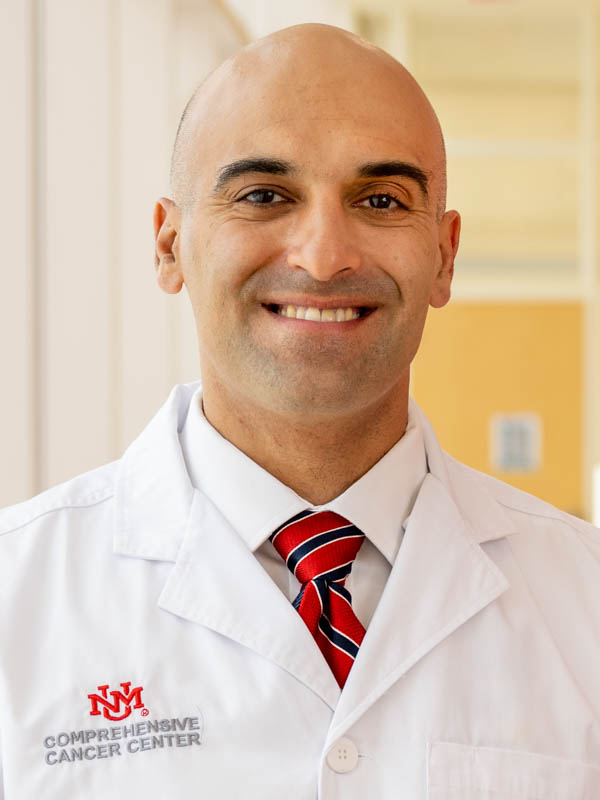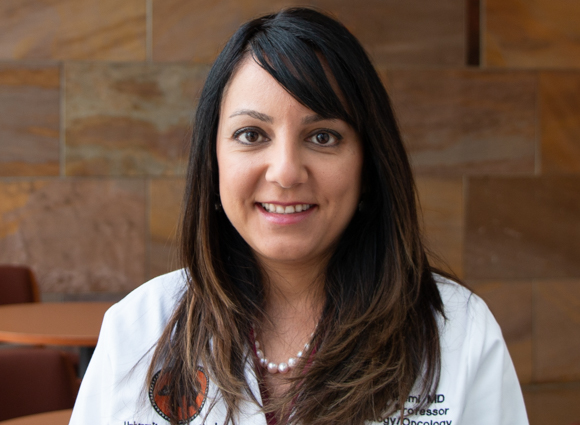
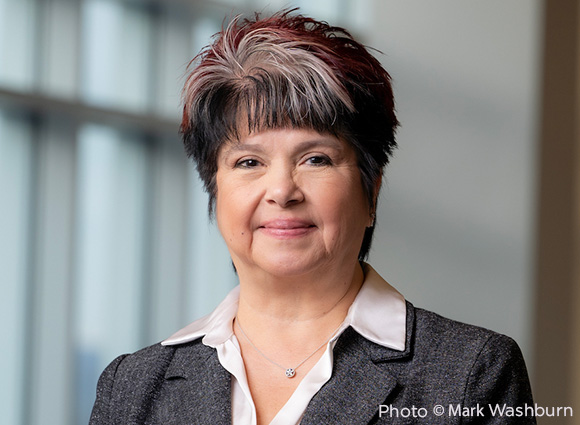
I’m looking forward to partnering with community stakeholders...to fuel transdisciplinary research and develop innovative methods...to reduce the cancer burden and overcome health disparities in New Mexico. Yolanda Sanchez, PhD
We give [patients] hope because we give them additional strategies to help with the symptoms they might be experiencing. Kelly Dunn, RDN, CSO, CNSC, LD
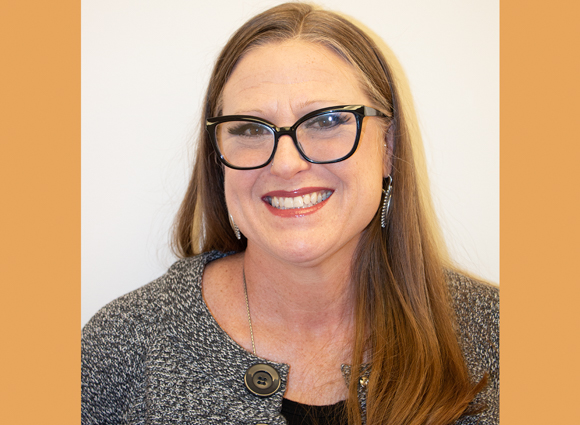
Lee named Director of Radiation Oncology
READ
MORE
David Y. Lee, MD, PhD, has been named Director of Radiation Oncology at The University of New Mexico Comprehensive Cancer Center.
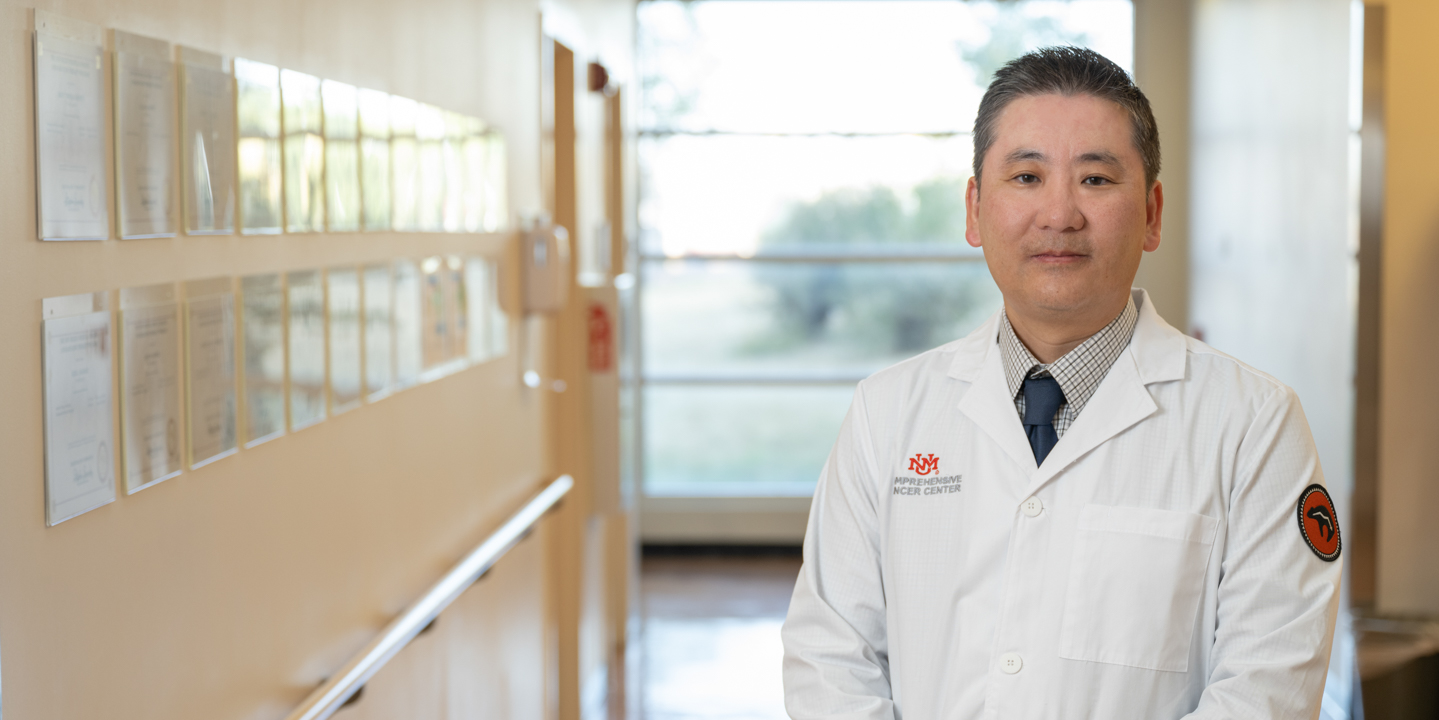
Read More
CLOSE
David Y. Lee, MD, PhD, has been named Director of Radiation Oncology at The University of New Mexico Comprehensive Cancer Center.
Dr. Lee was born in Korea and emigrated with his family as a teenager, settling in California. He trained at the University of Southern California Keck School of Medicine and then completed his residency at William Beaumont Hospital in Royal Oak, Michigan. He joined UNM in September 2012; New Mexico’s mountains, weather and outdoor activities drew him to our state.
Dr. Lee became a physician-scientist in order to bring the latest discoveries and information to his patients. He conducts research in DNA repair and epigenetics and recently won a grant from the Department of Defense to study tumor initiation in acinic cell carcinoma.
Dr. Lee assumed his new role on December 1, 2022.
Still Filling in the Gaps
UNM Dermatology Events to Help Rural New Mexicans Prevent Skin Cancer
2022 Skin Cancer Screening Events Held in:
Albuquerque
Carlsbad
Gallup
READ
MORE
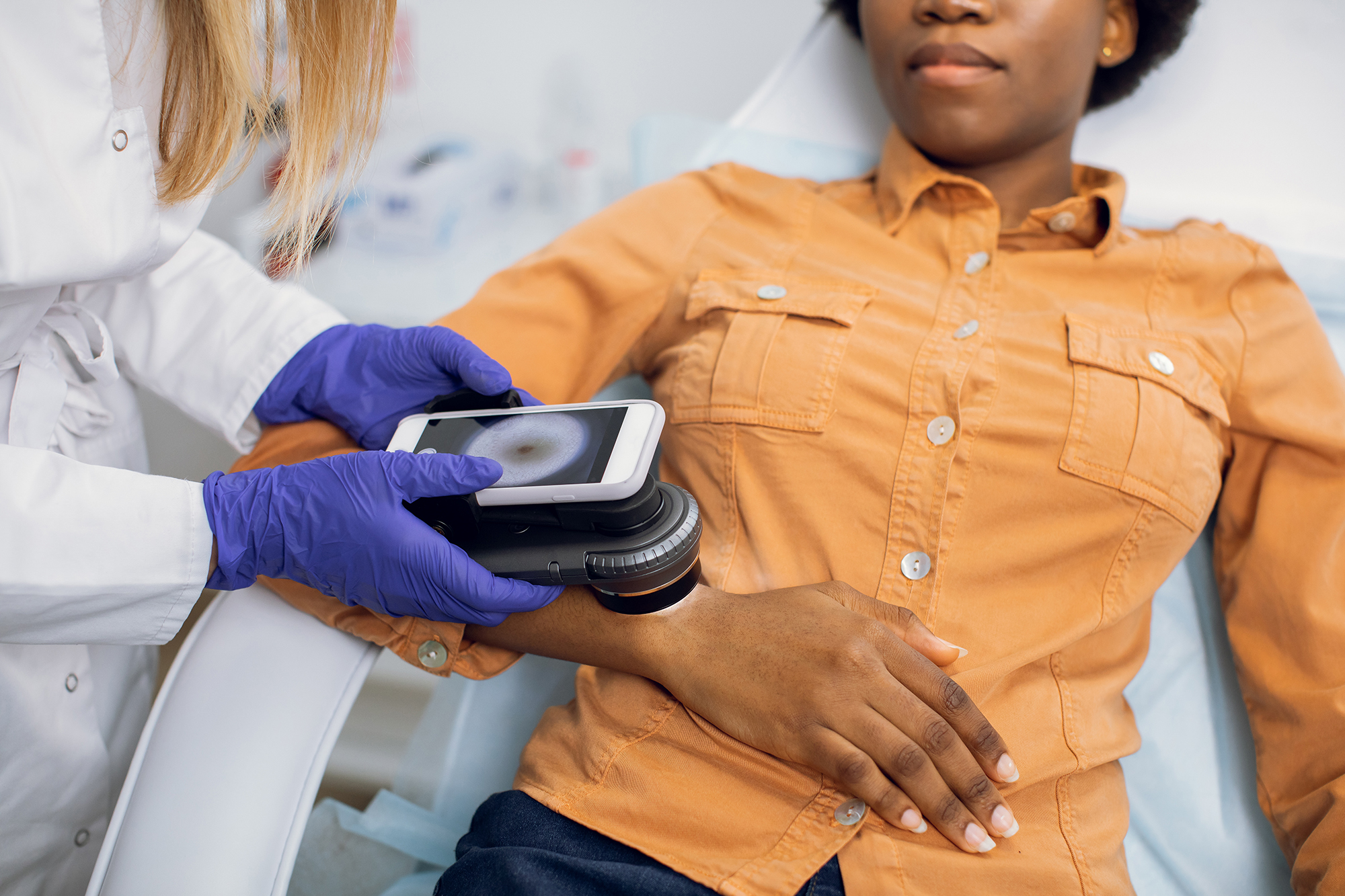
CLOSE
Still Filling in the Gaps
UNM Dermatology Events to Help Rural New Mexicans Prevent Skin Cancer
2022 Skin Cancer Screening Events Held in:
Albuquerque
Carlsbad
Gallup
Whether it’s enjoying some open space or working under a wide blue sky, New Mexicans often find their way outside.
With all that the Land of Enchantment has to offer, skin cancer isn’t on the top on anyone’s list. But abundant sunshine and a dearth of dermatologists in the state pose a challenge for detecting and treating the various forms of skin cancer.
“It’s a huge problem,” says John Durkin, MD, MBA, an assistant professor in the Department of Dermatology at The University of New Mexico. “We did a study in 2019 to gauge how many dermatologists were in the state, and we found 33 who were board-certified and practicing for a population of about 2 million people.” Studies reported in the Journal of the American Medical Association recommend at least double that number to provide good access to care.
Durkin added that the majority of those 33 doctors are based in New Mexico’s metropolitan areas. Most practice in Albuquerque, with some in Santa Fe and Las Cruces. Durkin himself practices at the UNM Medical Arts building and at the UNM Comprehensive Cancer Center.
New Mexico’s incidence of melanoma, the most serious and potentially deadly of skin cancers, is actually slightly lower than the national average, Durkin says. The lower rate might be due to New Mexico’s majority minority population. New Mexico has more people with darker skin types who, on average, tend to experience less incidence of melanoma.
But skin color doesn’t make them immune to skin cancer.
Basal cell and squamous cell carcinomas are the far more common types of skin cancers found in New Mexico, and they can affect anyone. Both types are thought to be related to lifetime sun exposure.
“It’s one of the gaps in education we see,” Durkin says. “People with darker skin types believe they’re not going to get skin cancer.”
Before the pandemic, the UNM Department of Dermatology and the UNM Cancer Center worked together to fill the gaps in access and education by hosting skin cancer screening events throughout the state. With the recent changes in indoor masking requirements, the events have now resumed.
The first of several new events was held in Albuquerque on Saturday, May 7, and another was held in Gallup on Saturday, August 6. The next event will be held in Carlsbad on Saturday, November 12.
Durkin hopes that people in rural areas of the state will take advantage of the shorter drive to the events. Screenings will be conducted on a first come, first served basis; no appointments are necessary. UNM medical students will assist people at the events and provide in-depth skin cancer education to everyone who attends.
The events are designed to provide skin screenings only. People can come to have a certain spot checked, and gowns will be available for those who want larger regions of their body examined. Durkin says no procedures will be performed at these events. Instead, people will be given a report detailing their exam findings and options for follow-up appointments with providers in the state, including those at the UNM Cancer Center and other locations.
Durkin says the UNM Department of Dermatology is taking additional steps to fill the void of dermatologists, including introducing medical students to knowledge about skin cancer, educating primary care trainees and other providers, and leading a well-respected dermatology residency program to train future specialists.
The department’s goal, Durkin says, is to train new doctors and help them see the value of staying in New Mexico, serving the people here, and having more confidence in their ability to recognize and treat skin cancer.
About John Durkin, MD, MBA, FAAD
John Durkin, MD, MBA, FAAD, joined the UNM Department of Dermatology in July 2018 as an assistant professor. He received his medical degree from the University of Pittsburgh and completed his residency at Drexel University, where he served as chief resident. His areas of clinical interest include digital imaging and diagnostic techniques, such as dermoscopy, optical coherence tomography and reflective confocal microscopy. He is also interested in pigmented lesions (moles) and melanoma, hereditary cancer syndromes, and noninvasive treatment of skin cancer. In addition, Durkin also provides aesthetic services such as Botox, peels, fillers, laser treatments and serves as director of Undergraduate Medical Education for rotating medical students.
New Direction
READ
MORE
Dartmouth scientist and leader Yolanda Sanchez, PhD, a pioneer in cancer research, has been named Director and CEO of The University of New Mexico Comprehensive Cancer Center.
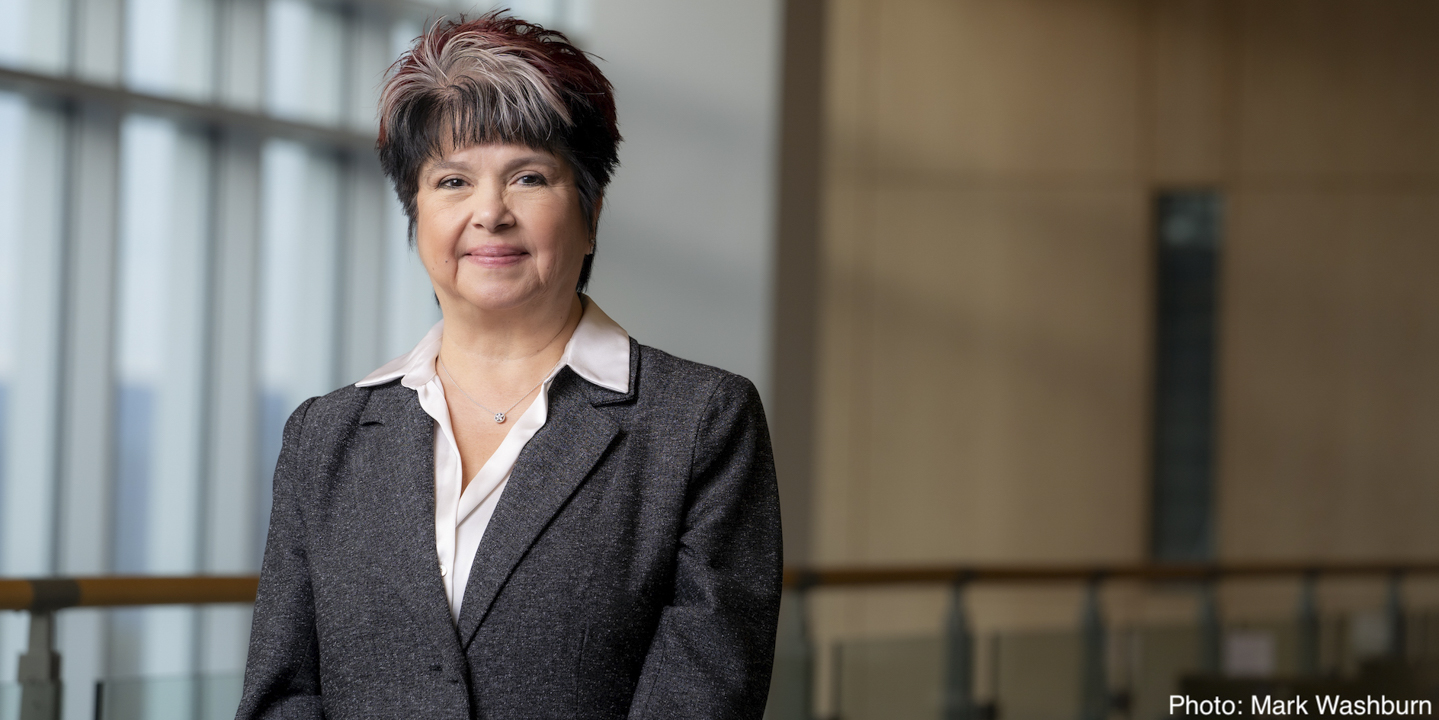
New Direction
“As a Mexican-American scientist, faculty member and leader, Dr. Sanchez brings a unique perspective to diversity, equity and inclusion efforts at academic institutions,” said Douglas Ziedonis, MD, MPH, executive vice president for Health Sciences and CEO of the UNM Health System.
“I was very impressed throughout the selection process with her motivation to be at UNM in this role, including her desire to return to this part of the country and make a difference in enhancing the health of all New Mexicans.”
“I am so pleased that Dr. Sanchez will be joining our academic medical enterprise to lead the UNM Comprehensive Cancer Center,” said UNM President Garnett S. Stokes. “She is a proven leader and collaborator, and I feel confident she will draw upon and find inspiration in the many talents and experiences of our UNM Health community to develop and drive strategy for the future success of the UNM Comprehensive Cancer Center.”
Sanchez said she is looking forward to returning to the Southwest.
“This is the opportunity of a lifetime,” she said. “I’m looking forward to partnering with community stakeholders – including the American Indian pueblos and nations and Black and Hispanic communities – to fuel transdisciplinary research and develop innovative methods to translate UNM Comprehensive Cancer Center discoveries to reduce the cancer burden and overcome health disparities in New Mexico.”
Sanchez has led in enhancing community partnerships and engagement and been an advocate for innovative approaches to enhance excellence in diversity, equity and inclusion in academic and health institutions for faculty, staff and students. The mission for her work on the scientific advisory board of the Cancer Center’s Community Outreach and Engagement was to help rural and underserved communities.
Her research leadership roles have included integrating initiatives across basic science, population science and clinical research to ensure high-quality collaborative activities across research programs. Her work on the Early Phase Trials Program steering committee was critical in ensuring that opportunities for clinical and translational research are explored and supported by pilot funding, and that clinical collaborations for translational research are nurtured effectively.
“Dr. Sanchez demonstrated throughout our selection process an excellent understanding of cancer center clinical services matters,” Ziedonis said. “Our UNM clinical leaders, in the Cancer Center and across our Health System, were very impressed with her openness for collaboration and understanding of clinical and prevention matters.”
Sanchez completed her undergraduate and graduate degrees in the University of Texas system and completed her PhD research at the MD Anderson Cancer Center. She joined the University of Cincinnati College of Medicine faculty in 1998 and was granted tenure in 2004. She was recruited to Dartmouth Medical School (now known as the Geisel School of Medicine) in 2006.
Sanchez has worked extensively with leaders of clinical oncology groups in the Dartmouth Cancer Center, an NCI-designated comprehensive cancer center, and Dartmouth Health System to understand their concerns and clinical care passions and found ways to increase research and mentoring in those settings.
As a co-investigator of Dartmouth’s Program for Oncology Workforce Education and Research Experience, she helped develop innovative training and recruitment platforms to help women and under-represented minorities pursue careers in oncology.
In addition to her research leadership, Sanchez is an accomplished independent research investigator. Her laboratory studies the mechanisms that maintain genomic integrity and the role of genomic instability in embryonic and cancer development, in particular the interplay between oncogenes and checkpoint pathways in the early stages of cancer development.
Sanchez’s pioneering research helped identify the CHK1 enzyme as a potential oncology target for cancer treatment, which has led to current Phase 1, Phase 2 and other clinical trials for certain tumor types, including those that have mutations in the BRCA 1-2 pathway.
She has translated her research findings in genomic integrity and cancer drug discovery into numerous patents for economic development, as well as to further the field, develop research teams and mentor trainees and junior faculty to develop their own successful research careers.
Sanchez’ husband, Craig Tomlinson, PhD, who currently directs the Dartmouth Genomic Shared Resources and serves as associate director of the Shared Resources at Dartmouth Cancer Center, will join UNM Health Sciences and provide leadership in enhancing research shared services.
Ziedonis thanked Alan Tomkinson, PhD, professor in the Department of Internal Medicine, who has served as the UNM Cancer Center’s interim CEO and Director since Dr. Cheryl Willman’s transition to the Mayo Clinic in 2021. In addition, he thanked Drs. Zoneddy Dayao and Carolyn Muller, for providing additional critical leadership for the Cancer Center during the transition, as well as the search committee led by Mark Unruh, MD, chair of the UNM Department of Internal Medicine, and those who provided input in the search process.
In His Blood
Dr. Shashank Cingam Took a Lesson on Cellular Biology From his Father and Made it Into a Career Fighting Blood Cancers
READ
MORE
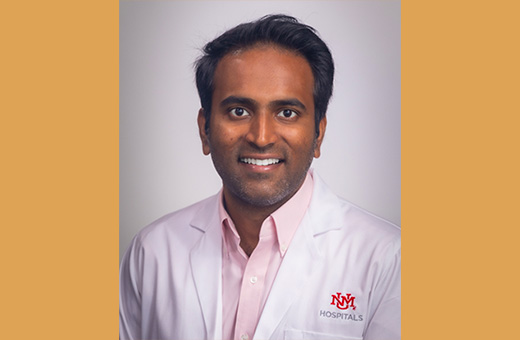
CLOSE
In His Blood
One of Shashank Cingam’s first lessons in biology and medicine came from his father, and it’s stuck with him his whole life.
“My father teaches biology for high school students. That’s how I got interested in biology to start with,” Cingam said. “I remember this one day where I had my father explain to me about meiosis and mitosis, which is the cell reproduction cycle. And now that I think about it, just that one chapter in the cell cycle really made me interested in biology.”
This fascination with cell reproduction led him into medical school and eventually to cancer treatment.
The science behind how cells reproduce, and particularly how they can carry mutations with them, lies at the heart of cancer research and treatment.
Studying pathology in my second year of medical school, they also talk about the cell cycle; how it gets overwhelmed when there are certain mutations, and when and how the immune system works to try to prevent all these cancers from showing up. That’s where my love for cancer treatment started.
— Shashank Cingam, MD
It is especially true for Cingam’s chosen specialty: hematological malignancies.
“Studying pathology in my second year of medical school, they also talk about the cell cycle; how it gets overwhelmed when there are certain mutations, and when and how the immune system works to try to prevent all these cancers from showing up,” he said. “That’s where my love for cancer treatment started.”
Cingam completed his undergraduate and medical degrees in his native India before coming to the U.S. He did his internal medicine residency at Louisiana State University before looking further west to New Mexico.
“I was really shocked to see such a big cancer center out of nowhere, helping the whole of New Mexico. I decided to rank it No. 1 on my interview list,” he said. He was impressed by The University of New Mexico Comprehensive Cancer Center’s role within a largely rural state, with no other similar center within 500 miles.
“It was such a unique situation, and it was a National Cancer Institute-designated comprehensive cancer center, with all the research that goes on here,” he said.
Cingam came to UNM Cancer Center in 2018 and completed a fellowship in hematology-oncology.
As Cingam’s career in cancer treatment grew, his fascination with cellular biology continued to inform his choices. After finishing his fellowship at UNM, he moved to Stanford, where he completed a year-long fellowship in cellular therapy and bone marrow transplantation.
Cingam would not be gone from New Mexico for long. After finishing his fellowship, Cingam returned to the UNM Cancer Center in June and joined the Leukemia, Lymphoma and Myeloma team.
Cingam said he and his wife love New Mexico and he hopes to become involved with patient outreach and education here.
The Value of Vigilance
READ
MORE
UNM Breast Cancer Specialist Stresses the Importance of Early Detection
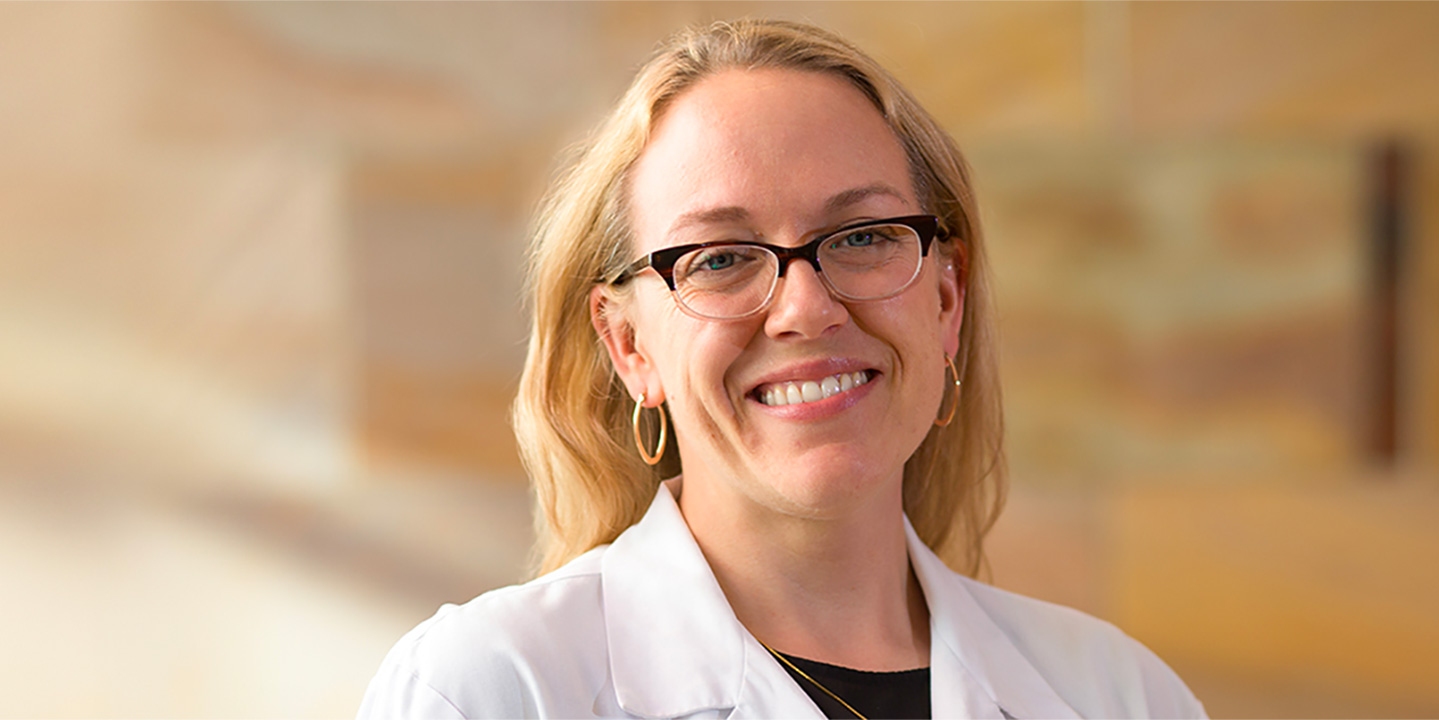
The Value of Vigilance
While finding a lump in the breast is no cause for panic, experts advise to never ignore the signs of breast cancer, because early detection can save lives.
The incidence of breast cancer has increased, said Ursa Brown-Glaberman, MD, a breast cancer specialist at The University of New Mexico Comprehensive Cancer Center. At the same time, “survival from breast cancer has actually been improving over the past couple of decades,” she said.
The improvement in survival can be attributed to two things: early detection and improved treatments.
“Women are getting diagnosed earlier and at earlier stages, when breast cancer is more curable, so credit certainly goes to good screening and to the mammographers,” Brown-Glaberman said. “But also, the treatment for breast cancer has improved dramatically over the past 20 years – we have better treatments and new drugs – and we know how to tailor those treatments more effectively.”
Breast cancer may produce virtually no symptoms when the tumor is small and at its most treatable. The five-year survival rate for women diagnosed with breast cancer that has not spread is 99 percent. But if the cancer has spread to distant organs, the survival rate drops to 26 percent. That’s why screening to detect early-stage breast cancer is very important.
“I always tell people – even very young women – to never blow off a finding in the breast,” Brown-Glaberman said. “You want to follow it up, and if things persist, you want to be evaluated by a health care provider.”
According to the American Cancer Society, an estimated 1,700 New Mexican women will be diagnosed with breast cancer and about 290 will die from the disease in 2022.
“We know that this is a common disease affecting women every day in our state,” Brown-Glaberman said.
The Breast Team at the UNM Comprehensive Cancer Center offers the full spectrum of care, from diagnosis through treatment and survivorship. This includes screening services, such as genetic counseling to determine risk (which can lead to genetic testing), as well as physical exams and mammograms and diagnostic services. They also offer testing and biopsies and treatment plans that include hormone therapy, chemotherapy, radiation therapy and surgery.
I’m really proud of our breast program and team . . . within the walls of the UNM Comprehensive Cancer Center, we have all the pieces that you need to diagnose and treat a breast cancer patient in a personalized way, tailored to her needs.
— Ursa Brown-Glaberman, MD
“I’m really proud of our breast program and team at the Cancer Center. We offer true multi-disciplinary breast care,” Brown-Glaberman said. “That means within the walls of the Cancer Center we have all the pieces that you need to help diagnose and treat a breast cancer patient in a personalized way, tailored to her needs.”
Brown-Glaberman recommends that women between the ages of 50 and 70 should get a mammogram annually or every two years depending on their risk factors, as mammograms work best when they can be compared with previous ones.
Younger women, from ages 40 to 50, should consider talking to their health care provider about when to start and how often to get a mammogram, especially if they have a family history of breast cancer. Similarly, women over age 70 should have a discussion about ongoing screening with their health care provider.
“Sometimes, if a woman has a really strong family history, we will recommend things like genetic testing or high-risk screening, adding more to the routine mammogram,” she said. “We try to refine screening recommendations unique to each woman’s personal and family history.”
Women who have inherited certain gene mutations, such as BRCA1 and BRCA2, are at a higher risk of breast cancer. Because the BRCA1 and BRCA2 gene mutations also raise the risk of ovarian cancer, Brown-Glaberman said women with a first-degree family history of ovarian cancer are also at risk of getting breast cancer.
“If a woman came in to see me and either had a strong family history of breast cancer or a first-degree relative with ovarian cancer, I might recommend she see a genetic counselor and have more rigorous breast cancer screening outside of the routine mammogram that we recommend for everyone,” she said.
While there aren’t many concrete personal and environmental factors that can contribute to a person’s risk of developing breast cancer – in the way smoking is a known risk factor for lung cancer – Brown-Glaberman said some potential risk factors for breast cancer (other than a family history of the disease) include heavy alcohol consumption, post-menopausal hormone use, obesity and reproductive history, such as not having had children.
Brown-Glaberman said it’s also important to note that breast cancer has no gender. Men, including transgender men, as well as nonbinary people are also at risk of getting breast cancer, as every person has breast tissue.
“We take care of all patients with breast cancer, including men and transgender people,” she said. “We welcome them in our clinics and have the expertise to take care of a diverse group of people with breast cancer.”
In addition to providing routine cancer care, Brown-Glaberman said the Cancer Center also runs numerous clinical trials to better diagnose, prevent and treat cancer. Clinical trials run the spectrum, from evaluating new and improved screening methods and treatments, to reducing risk, supportive care and exercise interventions, as well as novel cancer treatments.
“We have a robust clinical trials program for people with breast cancer,” she said. “We have reduced the mortality rate from breast cancer over the years through very carefully run clinical trials. That’s how we move the needle and improve outcomes in this disease.”

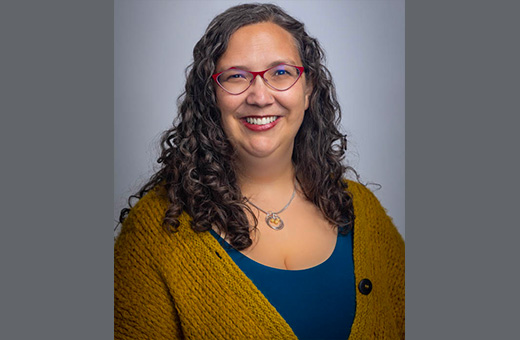
Putting it All Together
Colleen McCormick, MD, has a broad range of interests that led her to gynecologic oncology and the UNM Comprehensive Cancer Center.
READ
MORE
CLOSE
Putting it All Together
Colleen McCormick, MD, has a broad range of interests that led her to gynecologic oncology and the UNM Comprehensive Cancer Center.
Colleen McCormick, MD, likes to take seemingly different things and put them together.
Because of her broad interests, McCormick, who recently joined The University of New Mexico Comprehensive Cancer Center as a gynecologic oncologist, never thought a career in surgery would fill the bill.
Originally, even medicine wasn’t on the horizon. She was looking for something that could draw a line through her disparate interests in biochemistry, politics and economics.
“I thought maybe something in food development or urban planning or international work,” she said. “Then I did a program with the World Health Organization in Zimbabwe on missed opportunities for vaccination – we looked at which kids had different vaccinations rates – and it really made me feel like medicine was a possible combination. There was the social justice work and actual day-to-day things helping people, but on a scientific level.”
McCormick was so convinced that international public health was her path that she decided to get surgery out of the way first during her medical school rotations at Johns Hopkins University.
“I absolutely loved it,” she said. “I’m someone who really likes getting stuff done and I like doing stuff with my hands. I was drawn to the immediacy of it.”
But her newfound love of surgery offered a new pattern for the intricate tapestry McCormick was trying to weave in her career. She knew she wanted to do surgery, but she also wanted to have an impact on patients over a longer period of time.
“Gynecologic oncology fit perfectly with what I wanted to do,” she said. “I’m able to operate on people and I get to use my hands, and also I help patients from the entirety of our diagnosis.”
Gynecologic oncologists focus on just women’s reproductive cancers. Unlike most other cancer doctors, they perform surgery, give chemotherapy, and manage a patient’s cancer journey from diagnosis into survivorship.
McCormick found her way to Portland, Ore., where another interest began to take hold, one that would eventually draw her to New Mexico.
“I was in Portland for about 12 years and worked in a very busy private practice and hospital,” she said. “While I was there, I very much enjoyed being a busy clinician. But I started getting involved in a lot of clinical research and I ended up building and developing a clinical trials program in Portland. I felt like I needed to take the next step and be in an academic environment where those things are more valued.”
The UNM Comprehensive Cancer Center’s research mission and its robust clinical trials program made a great fit for McCormick’s expanding interests. She was also friends with Sarah Adams, MD, who serves as associate director of Translational Research in addition to seeing patients regularly at the Cancer Center’s clinic.
One of the other things really important to me is health equity and diversity, especially in the clinical trials realm. We really need to increase the inclusion and diversity of clinical trials. Given that those are long-standing passions of mine, this is a perfect place for that.
— Colleen McCormick, MD
McCormick said the opportunity to work with Adams on clinical trials and other research was a significant factor in her decision to join UNM. UNM Cancer Center physicians and scientists conduct research and also initiate clinical trials based on their own research. The UNM Cancer Center’s comprehensive designation from the National Cancer Institute also underscores its commitment to research.
“One of the other things really important to me is health equity and diversity, especially in the clinical trials realm,” she said. “We really need to increase the inclusion and diversity of clinical trials. Given that those are long-standing passions of mine, this is a perfect place for that.”
McCormick said she has already began working on a project that is looking into what barriers prevent some patients from participating in clinical trials. Having a diversity of patients in clinical trials helps scientists clarify how these treatments apply to a broader patient base.
McCormick said that her ultimate goal is to provide the best possible care to each of her patients. That can include difficult conversations.
“Sometimes I get to give great news and I get to tell patients they don’t have cancer,” she said. “Other times, I’m taking care of patient for a really long time and sometimes I help them with their transition to hospice. Helping them through the death and dying process is a real privilege for me.”
McCormick said her interest in palliative care emerged during medical school and her residencies, and she later pursued a certification in palliative care. Having lost loved ones to cancer and prolonged illness she knows the conversations, however difficult, are a profound and crucial part of care.
“Nobody wants to say they love having a death-and-dying conversation with patients. But that part is very important to me – the conversations about what a patient’s goals are, how can we get them there,” she said. “How can we do our best to make sure you’re able to make Christmas cookies with your granddaughter one last time? Those kinds of conversations and that kind of relationship and focusing on quality of life are important to me.”
McCormick said she is thrilled to join the gynecologic oncology division at UNM. In addition to clinical trials, UNM offers opportunities as a NCORP (National Cancer Institute Community Oncology Research Program) minority/underserved community site. She is also especially excited to be able to teach fellows; the Gynecologic Oncology Fellowship program at UNM is one of fewer than 60 programs in the country.
“Being part of a great team, where everyone is working to provide the best care for our patients and our community, is exhilarating,” she said.
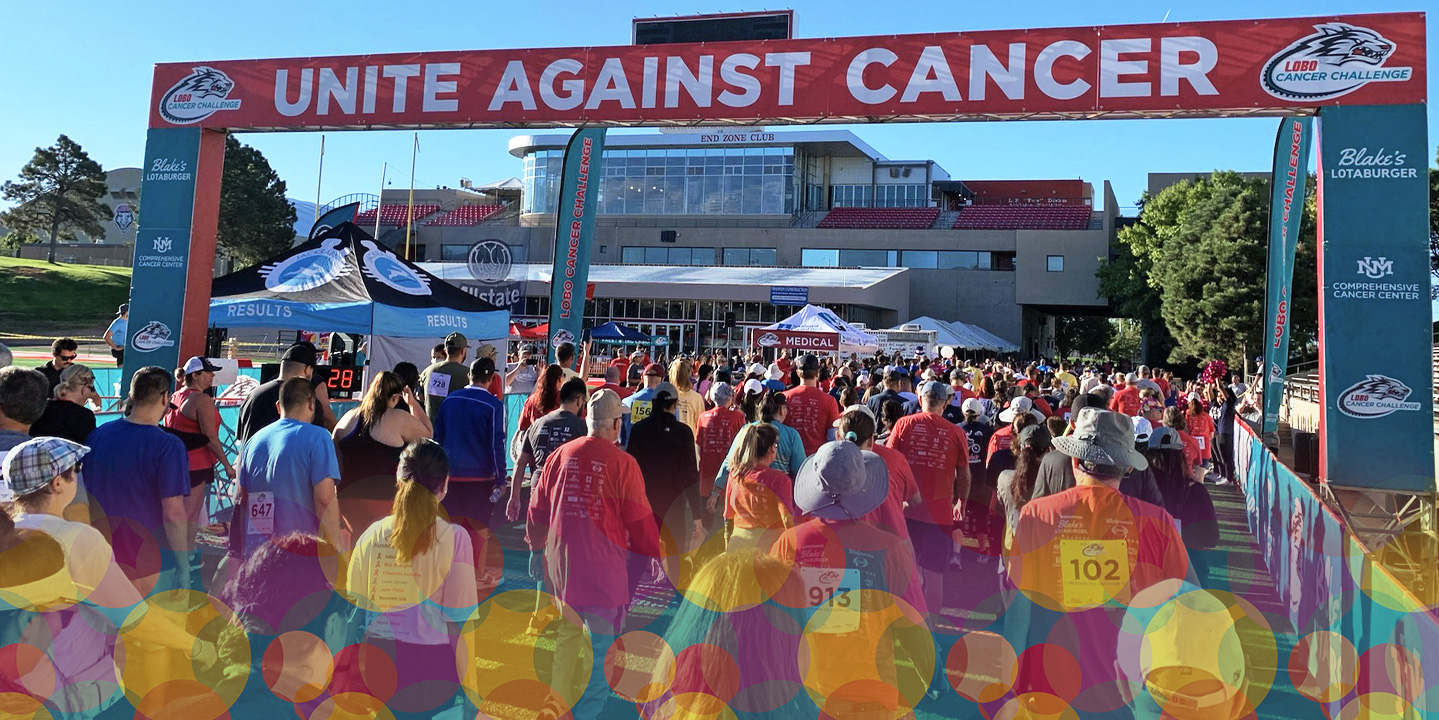
Lobo Cancer Challenge Returns
For its sixth year, our annual fundraising event supporting patient care, cancer research, community outreach, and education and training at the UNM Comprehensive Cancer Center, returned to be held in-person at University Stadium.
READ
MORE
CLOSE
Lobo Cancer Challenge Returns
Lobo Cancer Challenge Returns
Annual Fundraising Event to Benefit UNM Comprehensive Cancer Center Takes Place at University Stadium on September 24, 2022.
The Lobo Cancer Challenge is an annual fundraising event that supports patient care, cancer research, community outreach and education and training at The University of New Mexico Comprehensive Cancer Center. This is the event’s sixth year.
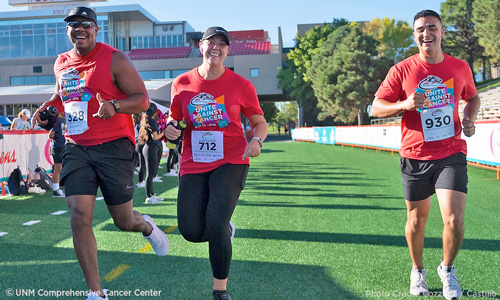
Why?
The UNM Comprehensive Cancer Center is the only cancer center in New Mexico that is designated by the National Cancer Institute and is one of only 51 NCI Comprehensive Cancer Centers.
The UNM Cancer Center offers cancer diagnosis, treatment and survivorship care to all New Mexicans. It conducts cancer research that focuses on those cancers that most frequently affect New Mexicans. It also offers clinical trials that make the latest drugs and therapies available to all New Mexicans. And, it trains cancer physicians, scientists, pharmacists and nurses every year.
Participants in the Lobo Cancer Challenge, called Challengers, may choose to ride their bicycles on a 25-, 50- or 100-mile route; run or walk the 5K route; or climb all the stairs in the stadium. Every dollar that Challengers raise supports the program they choose — and they may choose from among 19 programs.
Learn more and register at LoboCancerChallenge.org.
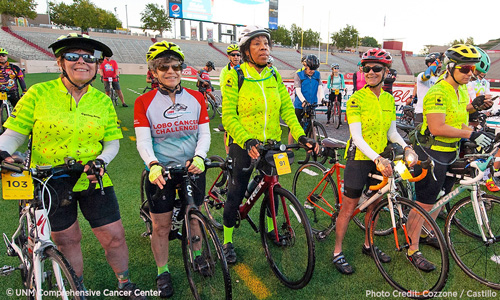
Who?
The Lobo Cancer Challenge is open to everyone.
When?
The event is Saturday, Sept. 24, and starts at 7 a.m.
Packet Pick-up begins Friday, Sept. 23, at 4 p.m. and is also available on Saturday, Sept. 24, from 6 to 7 a.m.
Where?
University Stadium
1111 University Blvd. SE, Albuquerque NM 87106
Event Update — A Successful 2022
851 Challengers in 78 teams along with 76 sponsors and all of our supporters: together we raised $373,500+ to #UniteAgainstCancer in New Mexico!
Interviews
Amy Liotta, Event Director
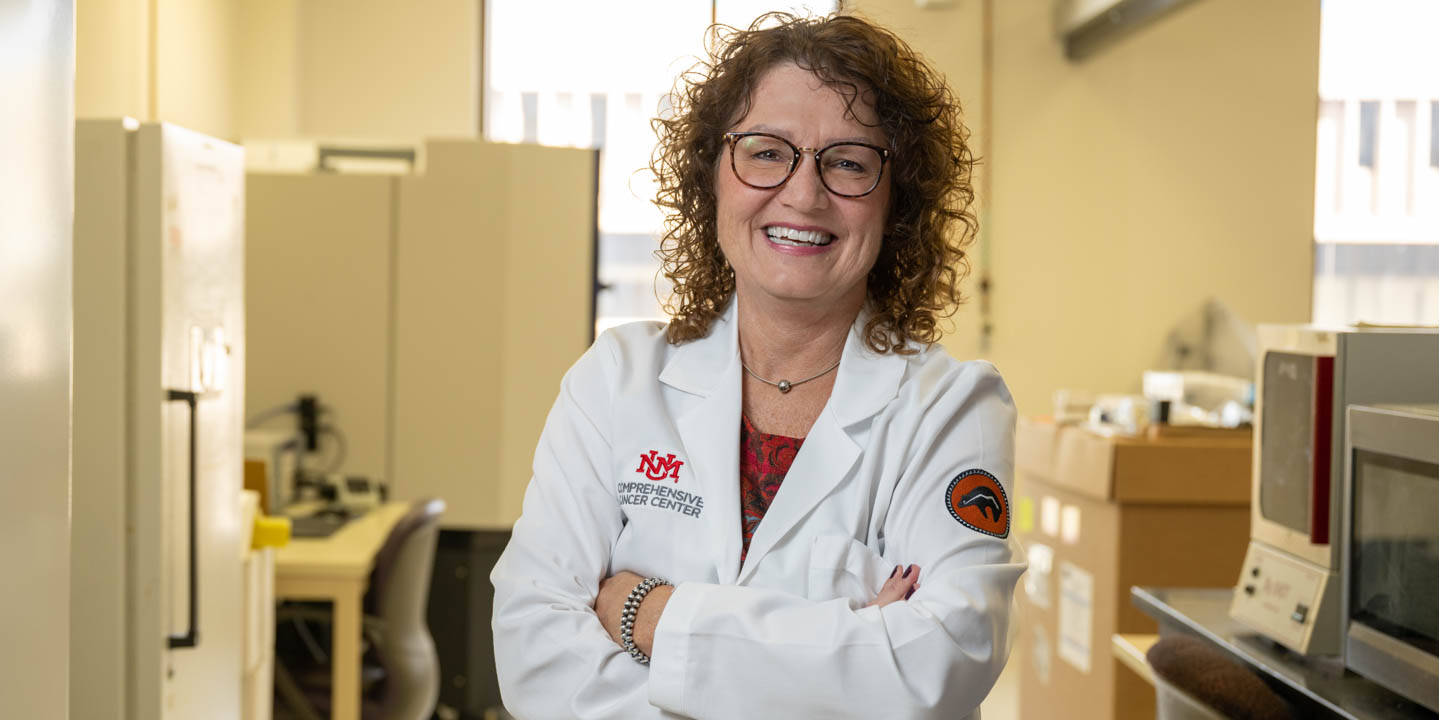
Molecular Musical Chairs
UNM Cancer Center Team Discovers a Common Drug Could Reduce the Risk of HPV Infection and HPV-Related Cancers
READ
MORE
CLOSE
Molecular Musical Chairs
UNM Cancer Center Team Discovers a Common Drug Could Reduce the Risk of HPV Infection and HPV-Related Cancers
The human papillomavirus (HPV) vaccine is safe and effective – but it’s not for everyone.
“Some people can’t be vaccinated,” says Michelle Ozbun, PhD. “They don’t have access to the vaccine, they can’t afford it or they can’t be vaccinated.”
According to the Centers for Disease Control and Prevention, HPV accounts for more than 90% of cervical cancers, more than 90% of anal cancers and a significant percent of other types of cancers.
Some people can’t be vaccinated. They don’t have access to the vaccine, they can’t afford it, or they can’t be vaccinated.
— Michelle Ozbun, PhD
Ozbun, a professor of Molecular Genetics & Microbiology and of Obstetrics & Gynecology at The University of New Mexico, conducts HPV research at the UNM Comprehensive Cancer Center.
She and her team published a research article earlier this year in Antimicrobial Agents and Chemotherapy in which they describe how a drug called protamine sulfate blocks HPV infection. Like a game of musical chairs among molecules, the drug molecules bind to heparan sulfate cell receptors, preventing HPV virus particles from doing so.
“The [HPV] virus has a net charge,” Ozbun says, “and the heparan sulfate cell receptor has a net charge. They attract one another. That’s what the virus uses to attach to cells.”
Once attached to the cell surface, a HPV particle can enter the cell and co-opt its molecular machinery to make more copies of itself. But if protamine sulfate molecules bind to the heparan sulfate cell receptors instead, HPV particles have nothing to attach to and the infectious process stalls.
Ozbun and her team reported that protamine sulfate not only prevents HPV infection but also reduces the risk of infection even after cells have been exposed to the virus. The team carried out their studies in lab experiments and in mice. The next step is to test the drug for this new use in people.
You have to come up with something that’s really good and that people will use.
— Michelle Ozbun, PhD
New drugs go through a decade or more of testing in people before receiving approval from the U.S. Food and Drug Administration (FDA), but once a drug has FDA approval, getting approval for a different use simply requires efficacy testing for the new use.
Protamine sulfate has had FDA approval for decades. Given intravenously, it counteracts a blood-thinning medication called heparin, which is often given to people before surgery to avoid complications during a procedure. After surgery, protamine sulfate is injected to restore the blood’s life-saving ability to clot.
The Ozbun team, inspired by the ideas of teammate Zurab Surviladze, PhD, knew that in blood, protamine sulfate blocks heparin by binding to heparan sulfate cell receptors. They designed studies to show that protamine sulfate could also bind to heparan sulfate cell receptors when applied topically.
They also found that protamine sulfate protects against all strains of HPV (the current HPV vaccine only protects against the nine most prevalent HPV types). And surprisingly, the team found that even after a cell had been exposed to HPV, protamine sulfate could keep the virus from taking over the cell and making more copies of itself.
“‘Infected’ means that the virus is already inside the cell and is starting to replicate,” Ozbun explains. “‘Exposed’ just means that the virus has come in contact with a cell that might take it up, but you can still block the virus from getting in and starting an infection.”
Ozbun wants to translate this discovery into something people can soon use.
“We talk about reducing risk,” Ozbun says of HPV infection. “One of the things that’s important to me is the possibility of getting it [protamine sulfate] into something that’s affordable.”
She and her team will study how protective protamine sulfate is when combined with hyaluronic acid, a common ingredient in skin moisturizers and sexual lubricants. Moisturizers and lubricants are cheaper than vaccines, and Ozbun hopes they can be a good way to reduce the risk of infection.
“You have to come up with something that’s really good and that people will use,” Ozbun says. She and her team may have discovered that something.
About Michelle Ozbun, PhD
Michelle Ozbun, PhD, is a professor in the UNM departments of Obstetrics & Gynecology and Molecular Genetics & Microbiology. She is The Maralyn S. Budke Endowed Professor in Viral Oncology and co-leads the Cellular and Molecular Oncology Research Program at the UNM Comprehensive Cancer Center.
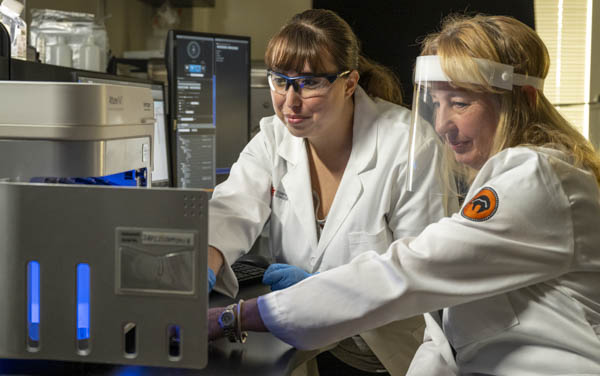
Intricate Interplay
New Federal Grant to Help UNM Cancer Center Scientist Study How to Stop One of the Most Deadly Cancers
READ
MORE
CLOSE
Intricate Interplay
New Federal Grant to Help UNM Cancer Center Scientist Study How to Stop One of the Most Deadly Cancers
Kimberly Leslie, MD, has always been interested in hormones and cancer. A New Mexico native and gynecologist specializing in high-risk pregnancies, Leslie has focused her research on uterine cancer since 1991.
Recently, the University of New Mexico Comprehensive Cancer Center researcher was awarded a four-year, $1.8 million grant from the Department of Defense (DOD) to further study high-risk uterine cancer.
“Only a few types of cancers have increased in incidence, morbidity and mortality,” Leslie says. “Cancer of the uterus is one of these. Clinical outcomes are worse today than in the 1980s.”
Leslie’s research has led her to study the differences between natural progesterone and synthetic progestins – hormones often used for birth control – and the influence of progesterone on a tumor suppressor protein called p53. The hormones, drugs and proteins, she’s learned, influence each other and the body’s cells in complex ways.
Progestins, like the hormone they mimic, bind to receptors on cells. Once bound, the receptors kick off a cascade of cellular reactions that control the cell’s behavior.
Women produce progesterone during their monthly cycles, and levels of the hormone skyrocket during pregnancy. But progesterone also affects tissues of the ovaries, uterus, breast and brain – all of which have progesterone receptors. Leslie wondered if progestins, too, affect these tissues and if so, how.
“It was not really known how these drugs truly impacted our bodies,” Leslie says, noting that they have been used for a very long time. “We now have more detailed molecular studies and protocols to understand at the level of gene transcription what these drugs are doing.”
We now have more detailed molecular studies and protocols to understand at the level of gene transcription what these drugs are doing.
— Kimberly Leslie, MD
Progestins are more shelf-stable than progesterone, are cheaper to produce, and can be taken orally as a pill. Women take progestins for many different reasons, Leslie says, including treatment for uterine cancer and endometrial cancer as well as for birth control. Leslie wants to be able to predict which progestins would work best for different women.
Leslie’s research on hormones and cancer led her to study the tumor suppressor gene called p53. Progesterone controls the TP53 gene, which produces the p53 protein.
“It’s called the guardian of the genome,” Leslie says. “Its job is to allow cells with damaged DNA to repair that DNA.”
But if the cell is unable to adequately repair the damage, the p53 protein programs the cell to self-destruct, preventing a cancer cell from developing.
“Cancer cells have to turn that tumor suppressor [p53 protein] off in order to become a cancer cell,” Leslie says.
A damaged or mutated TP53 gene creates a malfunctioning p53 protein, which permits cells with damaged DNA to continue reproducing. Eventually enough DNA damage accumulates in the surviving cells, and cancer develops. Most cancers result – at least partly – from a mutated TP53 gene.
Not every uterine cancer is a high-risk cancer, though. Leslie’s DOD grant will focus on discovering which tumors may benefit from a class of drugs called p53 reactivators.
These drugs were designed to reverse the effect of faulty TP53 genes and other genes that result in the mutant proteins that drive cancer. They have been approved for use in other types of cancers, but they have not yet been tested in women with uterine cancers.
Using the DOD grant, Leslie and her team have planned a series of studies that will test the effect of p53 reactivators on tumor cells donated by women with uterine cancer. She hopes the work will soon lead to new clinical trials that may help women receive personalized treatment for uterine cancer in the future.
About Kimberly Leslie, MD
Kimberly Leslie, MD, is a research professor in the UNM Department of Internal Medicine, Division of Molecular Medicine. From 2001 to 2009 she was the division director of Maternal-Fetal Medicine in the UNM Department of Obstetrics & Gynecology and the co-director of the UNM Cancer Center Women’s Research Program. From 2009 to 2020, Dr. Leslie served as Chair of the Department of Obstetrics & Gynecology at the University of Iowa. Now back at home in New Mexico, she is a member of the Cancer Therapeutics Research Group at the UNM Comprehensive Cancer Center, where she continues her research and mentors students and fellows.
About the Grant
The United States Department of Defense is supporting the research reported in this publication under Award Number W81XWH2210754/“Treating Advanced Uterine Endometrial Cancer by Reactivating p53.” The content is solely the responsibility of the authors and does not necessarily represent the official views of the Department of Defense.
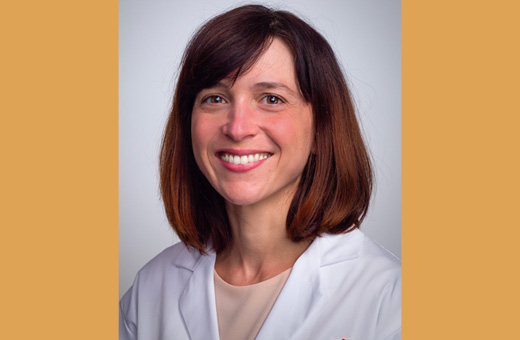
In With the New
New technologies and treatment approaches brought Lara McKean Basté to colorectal surgery and the UNM Comprehensive Cancer Center
READ
MORE
CLOSE
In With the New
New technologies and treatment approaches brought Lara McKean Basté to colorectal surgery and the UNM Comprehensive Cancer Center
A recent trend toward organ preservation for patients with rectal cancers could mean fewer procedures in the long run, but Lara McKean Basté, MD, one of The University of New Mexico Comprehensive Cancer Center’s newest colorectal surgeons, is perfectly fine with that.
“I think for me, what I find most interesting about rectal cancer is the multidisciplinary and individualized care and a new trend in treatment to offer organ preservation instead of surgery in selected patients,” she said.
“I love surgery, but I also know the consequences of doing surgery. I saw UNM was also interested in this treatment strategy that might be more beneficial for some patients and I wanted to be in a cancer center where I could offer that approach.”
McKean Basté said she knew she wanted to go into the medical field at a young age. But her initial interests were further up in the body.
“I went to my mother when I was 8 years old and told her I wanted to be a surgeon,” she said. “I think I told her I wanted to be a cardiac surgeon. It wasn’t until medical school that I decided it would be colorectal surgery.”
McKean Basté said the diversity of diseases in the lower intestine is what drew her to the practice. There are relatively benign issues like hemorrhoids, and there are severe diseases such as colitis and cancers.
“With both, you have a huge impact on the patient,” she said. “You can greatly improve their quality of life with both of them.”
McKean Basté grew up in Barcelona, Spain, and completed her medical schooling there. She did her general surgery residency at Yale University and Ochsner Health in New Orleans and fell in love with colorectal surgery during that time. She completed her fellowship in colorectal surgery at Oregon Health & Science University in Portland, Ore.
McKean Basté said she continued to develop her passion for surgery throughout her training in the U.S. There is a certain artistry or craftsmanship to surgery that first drew her to it, she said. The pace of surgery and the need to be ready for anything were also draws.
“You’re essentially creating and fixing things and you’re doing that with your own hands,” she said. “The nice thing about surgery is you can see the impact you have in your patients almost immediately, compared to other specialties.”
McKean Basté added that new technologies in surgery are also a bonus. Surgeons have access to advanced robotics and laparoscopic procedures, as well as large, open surgeries that allow her to refine her approach based on the patient.
Coming to the U.S. has allowed her to grow both as a surgeon and in her personal life.
“It was a hard transition, but I think it was a great life experience,” she said. “Moving to another country where I didn’t know the culture or how the system worked and having to learn to navigate this unfamiliarity was a challenge that made me grow as an individual.”
The UNM Comprehensive Cancer Center’s mission to serve all New Mexicans and its focus on serving all communities in the state resembled the system in which McKean Basté studied medicine in Barcelona.
“The mission of UNM really got me here. Serving the population of New Mexico and being more in the public health sphere — that was one of the reasons that drew me to UNM specifically. I really thought the mission was aligned to my ethics.”
— Laura McKean Basté, MD
The availability of clinical trials and especially the team approach at the UNM Cancer Center is also something she enjoys. It goes back to the idea that in colorectal surgeries, sometimes less is literally more.
“The Cancer Center puts the interests of the patient at the center,” she said. “You have a diverse group of medical oncologists, radiation oncologists, pathologists and radiologists all getting together trying to decide what is the best treatment option for you.”
Research Recruit
READ
MORE
Cheryl Sampson Hired to Lead UNM Comprehensive Cancer Center’s Clinical Research Office
Research Recruit
CLOSE
Cheryl Sampson Hired to Lead UNM Comprehensive Cancer Center’s Clinical Research Office
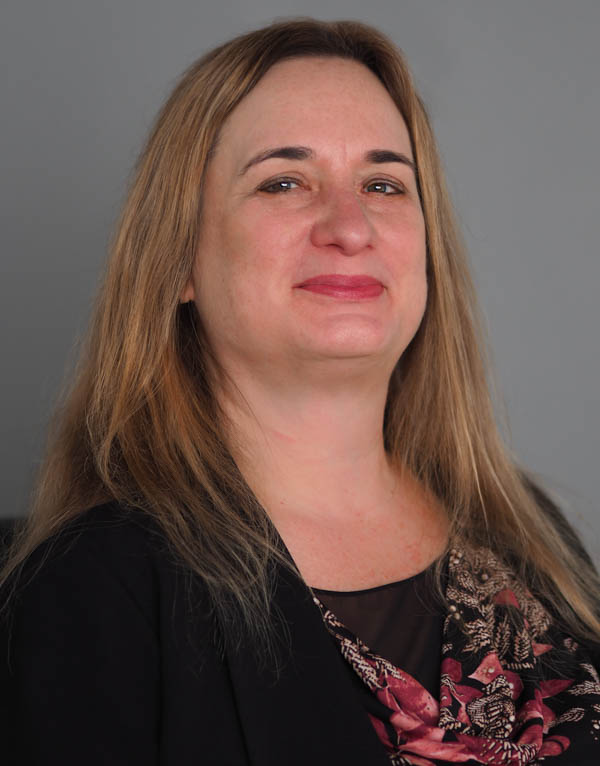 “At the end of the day, everything we do that is standard of care at one point was a clinical trial,” said Cheryl Sampson, MBA, newly hired director of the Cancer Center's Clinical Research Office.
“At the end of the day, everything we do that is standard of care at one point was a clinical trial,” said Cheryl Sampson, MBA, newly hired director of the Cancer Center's Clinical Research Office.Sampson will also serve as executive director of the New Mexico Cancer Research Alliance. She has been in both positions since February.
Sampson has close to 25 years in health care research administration, but that’s not where she started her career.
“My very first director, before she was a research director, was a really good friend,” Sampson said. “I was in an accounting position for an equipment company. She was looking for an administrative assistant.”
Sampson jumped at the opportunity, at Moffitt Cancer Center, in Tampa, Fla. (affiliated with the University of South Florida), and began working through the job promotion process.
The transition from general accounting to health care research posed unique challenges.
“Oncology has its own unique language,” Sampson said. “I was blessed with my first research director. She and I would get together on weekends for training sessions. She took me under her wing and trained me on the terminology and processes. At this point I can’t imagine doing anything else.”
She was promoted to a research compliance specialist, then into a supervisory position and eventually a leadership role.
Prior to coming to the UNM Cancer Center, Sampson served as vice president for research administration at SCL Health in Colorado.
She was the first person to serve in the role, helping coordinate and establish a centralized research operation at the health system.
“At the time, it was very decentralized, she said. “There was no research department. Each care site, if they wanted to do research, had their own program. None of the sites had standardized operating procedures. People may or may not have reported to someone who understood research. That’s really why I was brought in was to standardize and bring it all under one infrastructure.”
Sampson’s experience at both a university cancer center and in the health system setting gives her a unique combination of experience that suits the unique nature of the job in New Mexico.
“The New Mexico Cancer Research Alliance does a lot of work with community organizations like Presbyterian and Lovelace,” she said. “Having that blend of experience on the site side and on the university side actually interested me because it’s almost like my career has come full circle.”
At UNM and the New Mexico Cancer Research Alliance, Sampson will oversee a variety of tasks, from managing budgets to tracking clinical trials and making sure the trials offered at the UNM Cancer Center work for the population it serves.
“It’s really a matter of blending all of that together and making sure we have the right type of infrastructure to support our physicians who want to do clinical trials,” Sampson said. “It’s making sure patients are enrolled and their treatment follows our research protocols.”
There are eligibility criteria for every clinical trial, and one of the research office’s responsibilities is to make sure individual trials are a good fit for the UNM Cancer Center’s patients, Sampson said. That means tracking patients who come through the center to see if there’s a population of patients that fit the criteria. It’s also making sure there are not similar trials open already at the Cancer Center.
“It can sound very complicated, and it is. But it’s also essentially having the right people in the right positions too,” she said. “I do have a team and everybody has their niche.”
The research conducted at a comprehensive cancer center is not just crucial to the future of cancer care, but also to its present, Sampson said.
“Research is a significant component to getting designation by the National Cancer Institute as a comprehensive cancer center,” she said. “There are patients and caregivers who look for that information when deciding on a cancer center, or maybe they’ve heard about a clinical trial because anybody can go to clinical trials.gov and see which ones are available and where. It’s important.”
The UNM Cancer Center’s Clinical Research Office can be reached at 505-272-5490, or by email at HSC-ClinicalTrialInfo@salud.unm.edu.
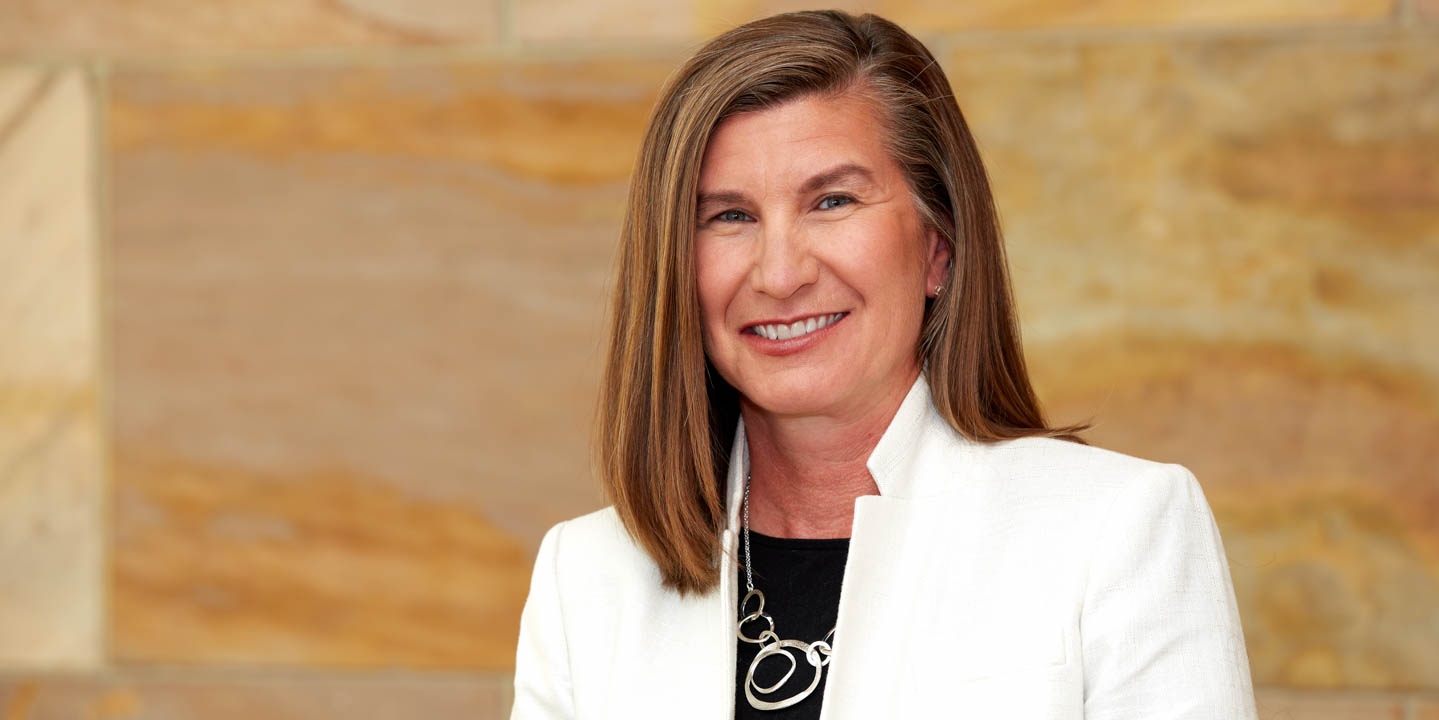
Getting Here from There
Two Grants from the American Cancer Society will help defray the costs of lodging and transportation for some UNM Comprehensive Cancer Center patients and their families.
READ
MORE
CLOSE
Getting Here from There
Two Grants from the American Cancer Society will help defray the costs of lodging and transportation for some UNM Comprehensive Cancer Center patients and their families.
The University of New Mexico Comprehensive Cancer Center’s mission to provide the highest quality cancer care to every New Mexican will get a boost this year with two grants from the American Cancer Society (ACS).
The UNM Comprehensive Cancer Center is the recipient of a $25,000 grant to help cover lodging costs for patients and families and another $10,000 grant to help cover transportation costs.
“This assistance is highly important,” said Jill Schulke, Patient Family Support Services director at the UNM Cancer Center. “It ultimately affects some patients who might not otherwise be successful with treatment if they are constantly stressed with having to find the means to stay here or get here.
“It also provides a sense of security in that they may not have to make so many monetary choices to offset the costs of cancer care. Many of our patients are burdened financially by loss of income during care, when maybe they are unable to work.”
Schulke noted that the money can help patients who are in Albuquerque or from far away but it’s intended to help patients who don’t have a way to pay for either transportation or lodging.
“It’s mainly for those who do not have coverage for either one, but we know they need to get here for treatment,” she said. “And, sometimes that treatment is for six weeks continuously, and it would be too difficult to drive back and forth.”
The UNM Cancer Center is the only National Cancer Institute-accredited comprehensive cancer center within a 500-mile radius and many patients must travel lengthy distances to get there.
The transportation grant will help roughly 300 patients over the year, Schulke said. It’s the third time the Cancer Center has received the grant, but the first time it was awarded $10,000. In the previous two years, the ACS awarded grants of $5,000.
This is the first time the ACS has offered the lodging grant.
Schulke also noted that New Mexico has a high number of socioeconomic disparities that play a factor in patients getting to Albuquerque and getting the care they need.
Disparities predominantly arise from inequities in work, wealth, income, education, housing and overall standard of living, as well as social barriers to high-quality cancer prevention, early detection and treatment services, the ACS said.
The grant program is a part of a collaborative approach to help communities with higher socioeconomic burdens, the ACS said, noting “Even the best treatment can’t work if a patient can’t get there.”
Schulke said the UNM Cancer Center has provided transportation and lodging assistance to patients over the years and the money has been written into the Patient Family Support Services budget.
The ACS grants help to fund that budget, as do in-kind donations and money raised from the annual Lobo Cancer Challenge event every fall.
All of those funding sources continue to be a part of the Patient Family Support Services Budget and the Lobo Cancer Challenge has even begun taking registration for its 2022 event.
Blasting Bladder Cancer
Two Clinical Trials at the UNM Cancer Center Help New Mexicans Keep Their Bladders and Fight Their Cancer
READ
MORE
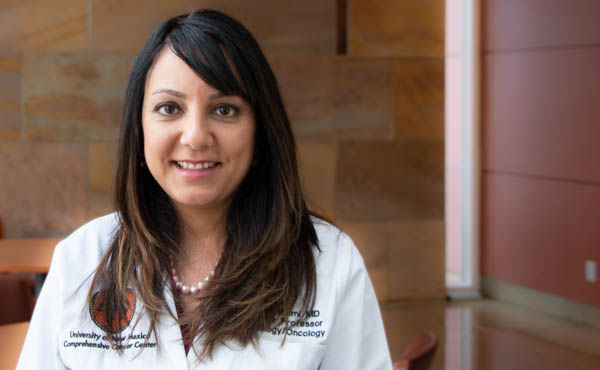
CLOSE
Blasting Bladder Cancer
Two Clinical Trials at the UNM Cancer Center Help New Mexicans Keep Their Bladders and Fight Their Cancer
Bladder cancer affects nearly 84,000 people in the United States each year, making it the sixth most common cancer. Most people survive it, but unfortunately, many lose their bladders.
Neda Hashemi, MD, and her team at The University of New Mexico Comprehensive Cancer Center are now offering several clinical trials, including one that will give people with bladder cancer a chance to fight their disease and keep their bladders.
Hashemi, an assistant professor and medical oncologist who specializes in treating prostate, bladder, testicular and kidney cancers, leads the UNM Cancer Center Genitourinary Cancers Team.
“Right now, for patients who have invasive bladder cancer that is not metastatic, the preferred treatment is chemotherapy followed by removing the bladder,” she says.
For those whose lymph nodes show signs that bladder cancer has started to spread, deciding on the best treatment is more difficult because removing the bladder is not as likely to cure them, Hashemi says. For those people, she says, chemo-radiation can be considered to reduce the tumor size and spread.
So certain people whose lymph nodes are affected and those who cannot have surgery for other reasons are treated with chemo-radiation, which doesn’t have as high a cure rate as bladder removal. It also causes scars to form on the bladder, making future bladder removal surgery difficult.
In a new clinical trial sponsored by the National Cancer Institute, Hashemi and her team offer people who have localized bladder cancer that has spread to the lymph nodes a chance to keep their bladders.
Trial participants will first receive chemotherapy, which is the standard treatment. After that, they will be given chemo-radiation with or without immune therapy and watched closely. All the drugs have been approved by the U.S. Food and Drug Administration (FDA).
We think immunotherapy has synergistic effects with radiation in patients who have regional-node bladder cancer.
— Neda Hashemi, MD
People on the clinical trial whose cancer does not respond to the chemo-radiation-immune therapy combination can then have surgery to remove their bladders before scars have a chance to develop, she says.
A second clinical trial will help people who have just been diagnosed with metastatic bladder cancer. It will give people either an FDA-approved drug or the drug plus an FDA-approved immune therapy.
The FDA-approved drug, enfortumab vedotin, is used by itself as a third treatment option for bladder cancer and has been shown to have an effect in half of people treated. But in a Phase 2 clinical trial in which enfotumab vodotin was paired with pembrolizumab, an FDA-approved immune therapy for bladder cancer, the two drugs together showed an effect in up to 70% of people. Hashemi says that is a very good response rate for bladder cancer.
The new clinical trial will test combinations of enfortumab vedotin with and without pembrolizumab and other drugs to see if the immune therapy can help even more people.
People must meet certain criteria to join the clinical trials, Hashemi says, but the trials give them more options throughout their treatment.
“If I am a patient,” Hashemi says, “I would like to know that the treatment I am receiving is the treatment that is personalized for me, based on my cancer response.”
About Dr. Hashemi
Neda Hashemi, MD, is an assistant professor in Department of Internal Medicine, Division of Hematology/Oncology, and the leader of the Genitourinary Clinical Working Group at the UNM Comprehensive Cancer Center. She and her team build and maintain a clinical trial menu that meets the unique needs of New Mexicans with genitourinary cancers. Hashemi collaborates with physicians in many of New Mexico’s communities through the New Mexico Cancer Care Alliance to offer clinical trials for prostate, bladder, testicular and kidney cancers to all New Mexicans.
About the Clinical Trials
“A Study of Chemotherapy and Radiation Therapy Compared to Chemotherapy and Radiation Therapy Plus MEDI4736 (Durvalumab) Immunotherapy for Bladder Cancer Which Has Spread to the Lymph Nodes (The INSPIRE Study)” is now open at the UNM Comprehensive Cancer Center. Read more about this clinical trial (NCT04216290).
“A Study of Enfortumab Vedotin Alone or With Other Therapies for Treatment of Urothelial Cancer (EV-103)” is now open at the UNM Comprehensive Cancer Center. Read more about this clinical trial (NCT03288545).
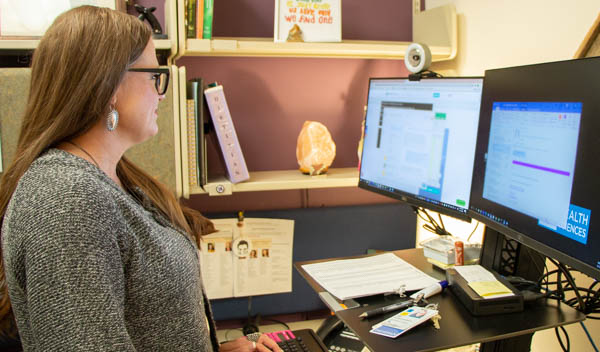
Food for the Fight
UNM Comprehensive Cancer Center Dietitians Provide Patients the Nutrition They Need
READ
MORE
CLOSE
Food for the Fight
UNM Comprehensive Cancer Center Dietitians Provide Patients the Nutrition They Need
There’s an old adage that food is medicine.
For The University of New Mexico Comprehensive Cancer Center, food is a crucial part of a patient’s journey from diagnosis, through treatment and beyond.
The UNM Comprehensive Cancer Center employs two dietitians, experts who provide patients with consultation, recommendations and sometimes even orders, to ensure the best nutrition possible as they face the challenge of fighting cancer.
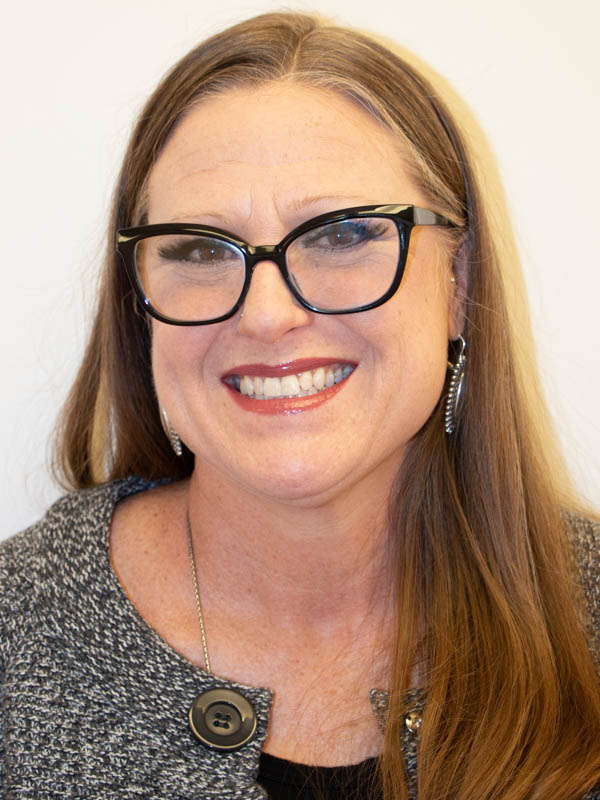 “If I was going to explain it to a patient, I would say that you don’t need to search online to answer your nutrition questions,” said UNM Cancer Center dietitian Kelly Dunn, RDN, CSO, CNSC, LD. “I’m going to answer your questions because I am trained to do it.”
“If I was going to explain it to a patient, I would say that you don’t need to search online to answer your nutrition questions,” said UNM Cancer Center dietitian Kelly Dunn, RDN, CSO, CNSC, LD. “I’m going to answer your questions because I am trained to do it.”
Dunn recently became board certified by the Academy of Nutrition and Dietetics in Oncology Nutrition. She is currently the only board-certified oncology nutrition specialist in New Mexico and is among the first in the state to receive such a designation.
Getting a certification in oncology requires 2,000 hours of internship and successful board examination.
That is in addition to what it takes to become a registered dietitian, which requires a bachelor’s degree, followed by 1,000 hours in a credentialed internship, along with successfully passing the national registration exam.
Dunn said the training that dietitians receive falls into five categories:
- Management
- Food Service
- Community (such as WIC, a senior center or Head Start)
- Clinical
- Research
Most dietitians, including Dunn, find their first jobs in clinical settings, particularly hospitals. But Dunn said she was attracted to oncology, particularly at a cancer center, because it allowed her to extend her practice beyond the four walls of a clinic.
Continued Care
Dunn completed all of her education, as well as much of her early career, in Texas, but she had been eyeing UNM Cancer Center for a number of reasons. Offering outpatient services was a big part of that, along with the fact that nutritional service is a part of the UNM Cancer Center’s team approach, and not an additional billable service.
“I found an inpatient hospital position where I could work with oncology patients while they were in the hospital,” she said. “That was difficult, because they’re in the hospital when they’re at their sickest. I got them through their illness and helped them with discharge and their education, but I didn’t get to be involved in their care long-term. I didn’t get to help them once they were not acutely ill anymore.
“I already knew by that time I wanted to be in oncology. I knew (UNM Cancer Center) was the place, because they would for sure always offer outpatient dietitian services.”
Dunn said that, in her experience, finding dietitians at a cancer center is rare. The fact that the UNM Cancer Center employs two shows the center’s commitment to including nutrition as part of a patient’s overall care.
Dunn works in concert with the UNM Cancer Center’s treatment teams. She begins her approach with an extensive interview with the patient.
“Part of the initial consult is information-seeking, so I let them know I have quite a few questions,” Dunn said. “That’s why I like to meet with them as early as I can. That way I can get a baseline of how they’ve been prior to and at the time of diagnosis.”
The questions don’t just dwell on food.
Dunn asks about their usual body weight, if they’ve encountered any recent unusual weight loss, how are they chewing and swallowing, and about their bowels. Then she asks about diet: what types of food they eat and how often. It’s crucial information in order to see if a patient is even meeting their caloric and protein needs, she said.
All of that information goes into creating a tailored plan for each of her patients.
“Keeping them nourished, maintaining their muscle mass and getting adequate protein can help reduce the side effects of all the treatment they are getting, which helps ensure they don’t have to miss a treatment or have doses reduced.
“They get the entire treatment as planned to have the best outcome. Or, after they finish their treatment and next need to be ready for surgery, we can ensure they are well-nourished and prepared to undergo a major surgery.”
Small Changes
The lack of time afforded to many New Mexicans poses a challenge to their diets, Dunn said.
“Individuals and families are grabbing quick to-go or drive-thru meals just to eat,” she said. “I don’t tackle it from a perspective of, ‘You have to stop it right now.’ I’m a realist, so I tackle it from the perspective of, ‘We have to figure out where you can go and what you can order so you’re making the healthiest choices possible.’ Then we talk about the menu and what they might order and what we might change about that.”
Change comes in incremental steps, Dunn said.
“Healthy eating is not a diet or a fad, so making slow changes one at a time is going to be the best way to implement a lifestyle that can become their everyday and just the way they live, versus this is something they were told to do,” Dunn said.
Lack of financial resources can also pose a challenge to some patients.
Understanding a patient’s limitations is also part of her screening process, Dunn said. Knowing how much they eat, what they eat, where they purchase their food and who prepares the food all go into a patient’s individual nutrition plan.
Sometimes the conversation expands to what community resources are available to patients, whether it be free grocery pickup or meal delivery services such as Meals on Wheels.
“We troubleshoot these challenges with the patients,” Dunn said. “Rather than me just saying, ‘You’re kind of up a creek,’ we strategize on the things we can do.”
Research Possibilities
While Dunn’s patient load can number in the thousands, she also is working to find ways to get involved in research.
She received her undergraduate degree from Baylor University and maintains contacts there. She said she is working with one of the researchers there who is looking into the effects of nutrition on the patients’ microbiome.
“I’m the only clinical, feet-on-the-floor dietitian she has who’s interacting with patients,” she said.
The initial publication will be a research review that printed in the Neoplasia Journal. The research team will then conduct a study looking at the dietary impact on the microbiome during cancer treatment for publication in oncology journals.
Because Dunn works so closely with the UNM Cancer Center’s surgical team, she has also presented potential study ideas about how malnutrition affects surgery.
“I’ve started working closely with the Preanasthesia Clinic and have presented a couple of ideas looking back and looking forward on nutrition status and surgical outcomes,” she said.
Hope
Dunn also makes regular presentations to providers within the UNM Cancer Center to educate and remind them of the important role a dietitian can play in the broader continuum of care.
A cancer diagnosis is frightening. Especially at first, the information about procedures and treatments is unintentionally bewildering and out of the patients’ control.
Dietary information, she said, can be a calming source of control.
“When patients are here and they’re feeling at their worst, we can give them hope,” she said. “We give them hope because we give them additional strategies to help with the symptoms they might be experiencing. We can talk about overcoming side effects and the impacts of symptoms and how to feel better without talking about every single system in their body.”
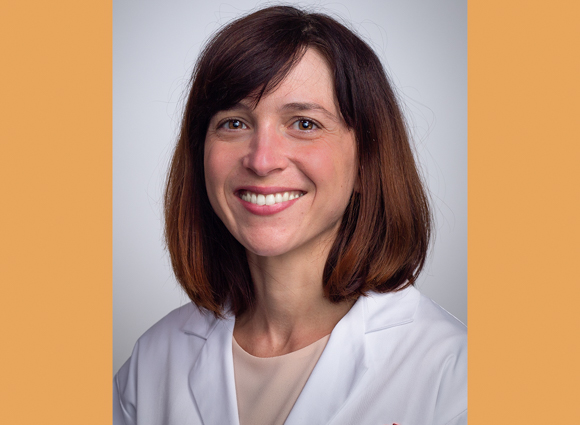
You have a diverse group of medical oncologists, radiation oncologists, pathologists and radiologists all getting together trying to decide what is the best treatment option for you. Lara McKean Basté
The trial is cancer agnostic. So it doesn’t matter what type of cancer you have, just what type of mutation. — Bernard Tawfik, MD
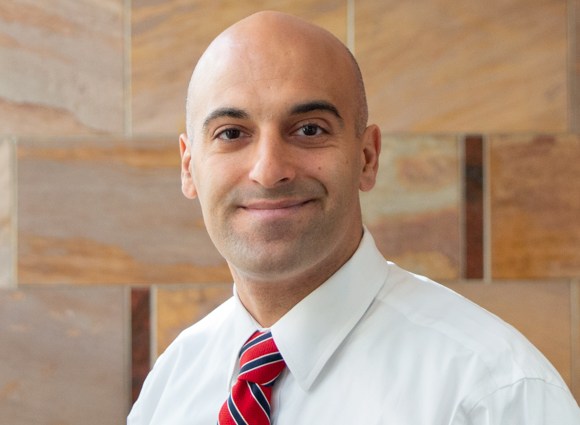
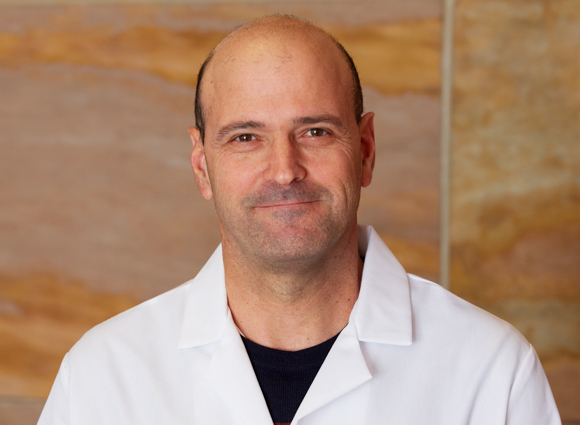
This endeavor encompasses the entire scope of surgical care, from the pre-operative clinic to the operating room and the in-patient floor, and finally looping back to the outpatient sphere. Itzhak Nir, MD
Mutation Matchmaking
UNM Cancer Center’s “Basket” Clinical Trial Matches Rare Cancer Mutations with Promising Drug Treatments
READ
MORE
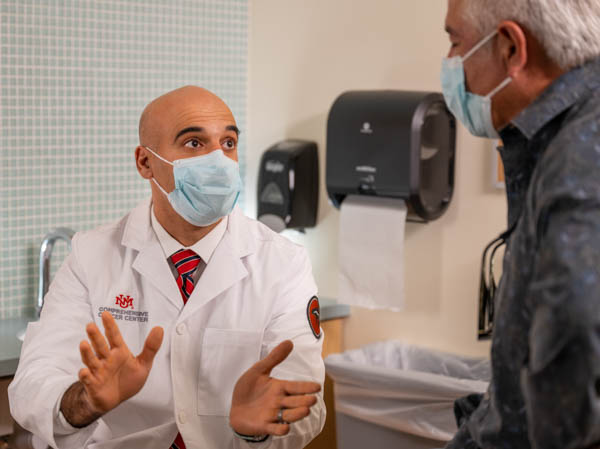
CLOSE
Mutation Matchmaking
UNM Cancer Center’s “Basket” Clinical Trial Matches Rare Cancer Mutations with Promising Drug Treatments
A new clinical trial at The University of New Mexico Comprehensive Cancer Center may help people who have rare cancer mutations and enable them to receive personalized cancer therapy.
The Targeted Agent and Profiling Utilization Registry (TAPURTM) Study is sponsored by the American Society of Clinical Oncology (ASCO). It matches drugs that target specific cancer mutations to people whose cancers have those mutations, regardless of where their cancers appear or what type of cancer they have.
“The trial is cancer agnostic,” says Bernard Tawfik, MD, a medical oncologist at the UNM Comprehensive Cancer Center and one of the clinical trial’s physician leaders. “So it doesn’t matter what type of cancer you have, just what type of mutation.”
Mutations are changes in a cell’s DNA that can interfere with how the cell normally functions. Cancer arises when enough mutations accumulate and the cell grows and multiplies uncontrollably. Targeted drugs interfere with the effects of specific mutations to stop cancer cells from growing and reproducing.
People with the same type of cancer often have the same mutations, and their cancers respond to the same treatments. But other people with that cancer do not respond because their cancer cells have a different set of mutations.
Medical oncologists like Tawfik must decide whether to give a targeted drug to someone who has a specific mutation but in a cancer that arises in a different part of the body.
“There are situations,” Tawfik says, “in which targeting a mutation in a certain cancer doesn’t help, even though targeting that same mutation helps in a different cancer.”
Cancer drugs that have approval from the U.S. Food and Drug Administration (FDA) often have limits on their use for this reason. But conducting a clinical trial for every possible combination of mutation and cancer type is not feasible.
“Basket” clinical trials offer a more efficient way to test several drugs against several mutations and cancer types at the same time. Each “basket” pairs a therapy that is targeted to one mutation or set of mutations. Several baskets can be made available simultaneously and change as new mutations and new therapies are developed.
The ASCO-TAPUR study has defined more than 50 combination baskets of cancer types and FDA-approved drugs, so that people with rare mutations may get access to a potentially life-saving treatment. And the number of combinations varies: some are removed and others are added weekly.
Tawfik explains that changing the combinations helps to capture information about mutations that occur infrequently in some cancers. The different combinations also allow researchers to test more drugs more quickly.
Ursa Brown-Glaberman, MD, medical director for Clinical Research at UNM Cancer Center, says that this approach also helps to deliver precision medicine, because people on the basket clinical trial get a targeted therapy or an immune therapy that addresses the specific mutations that their cancer has.
But the ASCO-TAPUR study is not for everyone. People wanting to join the clinical trial must first exhaust their standard treatment options and then have their cancer cells genetically tested. If testing reveals a rare mutation, and if a therapy that addresses that mutation is available in the clinical trial, then that person may participate in the study.
In addition to UNM Cancer Center, the ASCO-TAPUR clinical trial is open at Presbyterian Kaseman Hospital, Presbyterian Rust Medical Center/Jorgensen Cancer Center, Lovelace Medical Center (Saint Joseph Square), and Memorial Medical Center, all members of the New Mexico Cancer Research Alliance.
“UNM is leading this effort,” Brown-Glaberman says, “but it has generated interest from our oncology partners from across the state through our alliance network. It truly is a statewide effort.”
About Ursa Brown-Glaberman, MD
Ursa Brown-Glaberman, MD, is an associate professor in the Department of Internal Medicine, Division of Hematology/Oncology, in the UNM School of Medicine. She serves as medical director for Clinical Research at UNM Comprehensive Cancer Center and leads the Breast and Gastrointestinal Clinical Working Groups. She specializes in treating breast and gastrointestinal cancers. She received the National Cancer Institute’s Cancer Clinical Investigator Team Leadership Award in 2017.
About Bernard Tawfik, MD
Bernard Tawfik, MD, is an assistant professor in the Department of Internal Medicine, Division of Hematology/Oncology, in the UNM School of Medicine. He leads the neuroendocrine tumor Theranostics multidisciplinary team at UNM Comprehensive Cancer Center and specializes in treating breast, gastrointestinal and skin cancers.
About the ASCO-TAPUR study
The Targeted Agent and Profiling Utilization Registry (TAPURTM) Study is a clinical trial for people with later-stage cancer, focused on whether specific targeted therapies can benefit more patients and lead to more personalized therapies. The TAPUR Study is open and enrolling at 186 clinical sites nationwide. Learn more at https://www.cancer.net/research-and-advocacy/clinical-trials/what-tapur-study
Elevated Expertise
READ
MORE
New UNM Surgical Division Delivers Advanced Liver, Pancreas and Biliary Care to New Mexicans
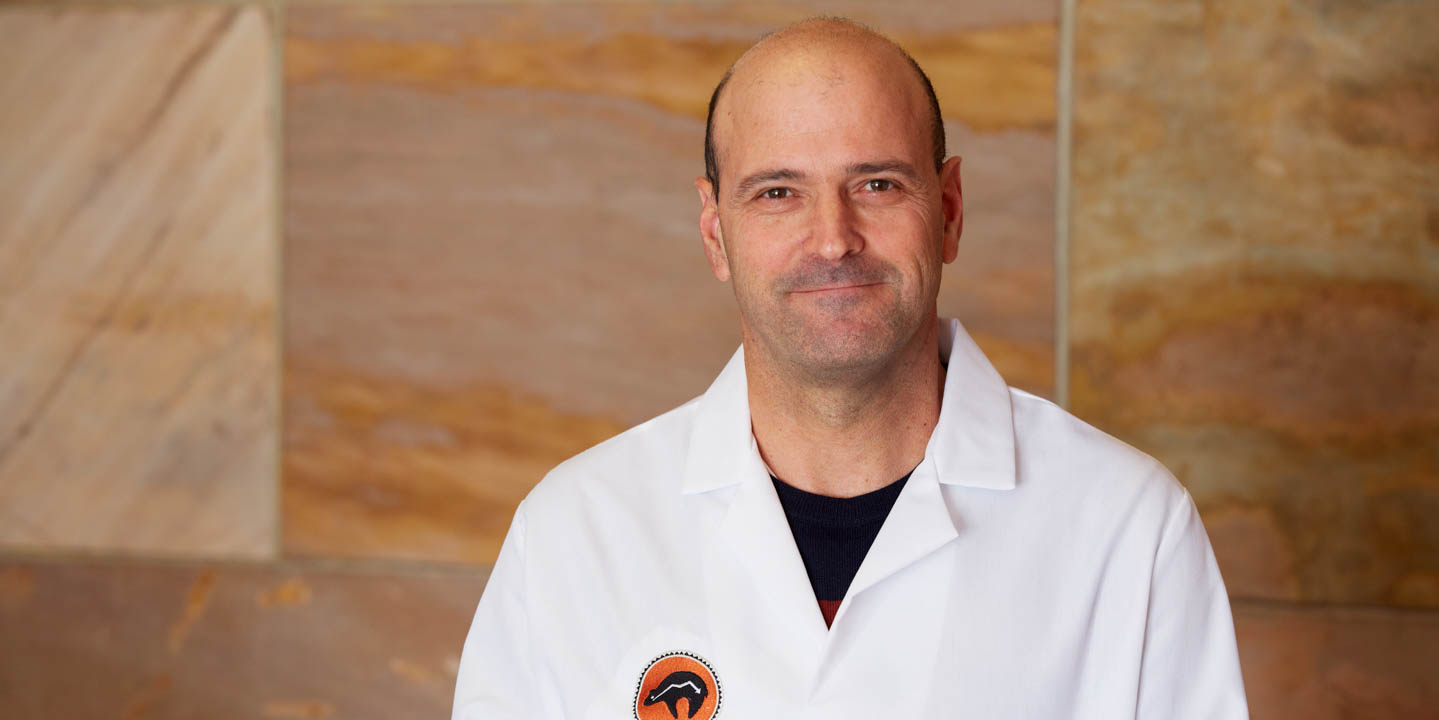
Elevated Expertise
CLOSE
New UNM Surgical Division Delivers Advanced Liver, Pancreas and Biliary Care to New Mexicans
The University of New Mexico Department of Surgery has created a new Division of Hepato-Pancreatico-Biliary (HPB) Surgery, dedicated to providing state-of-the-art care for liver, pancreas and bile duct-gall bladder diseases.
Surgical oncologist Itzhak Nir, MD, is the founding chief of the new division. He joined the UNM School of Medicine faculty in 2010 and practices at the UNM Comprehensive Cancer Center.
“As physicians, it is our mandate and responsibility to provide state-of-the-art care to our catchment area,” Nir said, noting that the UNM Cancer Center is the only one of its kind in a 500-mile radius.
"Fostering and maintaining these primarily elective services of unique expertise is not only an obligation of academic health sciences centers, including UNM, it’s also a penultimate source of pride.”
In 2017, as Nir was performing a growing number of liver and pancreas surgeries, he proposed to the Department of Surgery and to Cancer Center leadership that his practice be transformed into a service line. It soon became the regional center for the care of HPB ailments, with 1,500 new referrals over a two-year period.
These efforts received further academic recognition in June 2021 when the School of Medicine’s Committee of Chairs endorsed the creation of a 10th division within the Department of Surgery.
The HPB division has implemented a perioperative improvement project that has played a key role in improving patient outcomes, Nir said.
“This endeavor encompasses the entire scope of surgical care, from the pre-operative clinic to the operating room and the in-patient floor, and finally looping back to the outpatient sphere,” he said. “It required cross-institution commitment, with collaboration of doctors across different departments and subspecialties, as well as the engagement of nurses and ancillary services.”
This five-year venture resulted in significant improvements, Nir said, including adherence to best practices, shortening the time to therapeutic interventions and length of hospital stay, lowering readmission rates, reduction of opioid use, improved global patient satisfaction, and resource utilization efficiencies.
Nir credits UNM Health Sciences leaders for their ongoing support, as well as his colleagues from across the institution for their partnership and dedication.
“Most of all,” he said, “I thank my team – Dr. Benjamin Ferguson, nurse practitioners Anita Novak and Megan Bloom and nurse navigator Lynn Saavedra.”
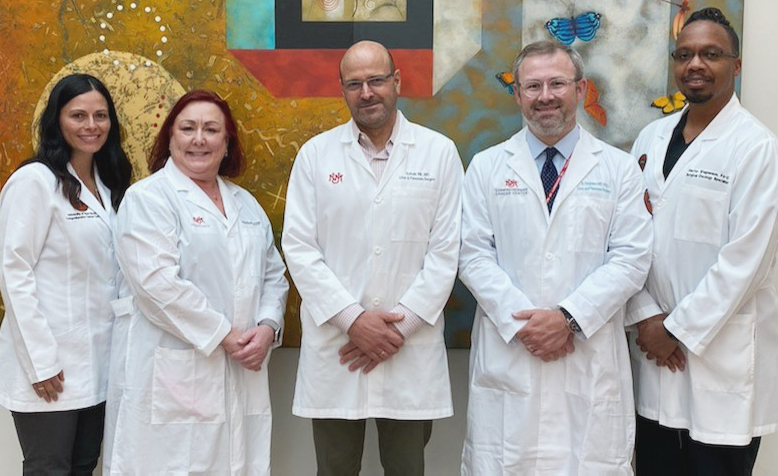
UNM HPB surgical team (from left to right): Lynn Saavedra, Anita Novak, Dr. Itzhak Nir, Dr. Benjamin Ferguson & Hector Stephenson; not pictured: Megan Bloom
Path of Discovery
Dr. Alissa Greenbaum’s journey to surgical oncology took several turns, but serving the underserved remains her north star.
READ
MORE
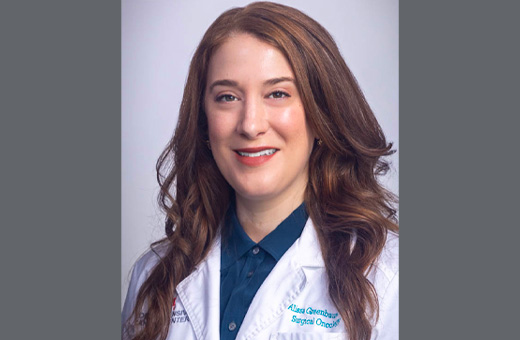
CLOSE
Path of Discovery
Dr. Alissa Greenbaum’s journey to surgical oncology took several turns, but serving the underserved remains her north star.
Alissa Greenbaum, MD, did not originally plan on becoming a surgical oncologist.
Her path to The University of New Mexico Comprehensive Cancer Center started in public health, and at first she planned to pursue a career in family practice.
“My interest has always been in disparities in health care. However, when I got to medical school and did my surgery rotation I quickly changed my course,” she said. “I really connected with the ability to make significant change in a short period of time with people.”
Greenbaum’s start in health care began with a volunteer stint in AmeriCorps, where she worked as a medical assistant in a community health setting in San Francisco.
“I worked with migrant workers and homeless youth,” she said. “I was a Spanish major in college and spent quite a bit of time in Mexico. I’m a bilingual provider in Spanish and that gives me an opportunity to connect with people as well – in their first language.”
Greenbaum received her medical degree from Oregon Health and Sciences University in Portland. In her third year of medical school, she did a rotation in surgery and fell in love with it.
“I liked the intensity of it,” she said. “The responsibility, the constant problem solving and again, being able to connect with people in that way both before and after the operation is extremely unique. Honestly the amount of trust that people put into you was the most profound aspect of it to me.”
In medical school, Greenbaum set her sights on becoming a trauma and critical care surgeon. This brought her to UNM in 2012 for general surgery residency training.
Even while the focus of her medical career was changing, one of the core motivations for Greenbaum – serving communities in need – remained. She chose UNM in part because she wanted to practice medicine in a hospital that cares for an underserved population. She also has a friend who is a pulmonary critical care doctor practicing at UNM who spoke often of the hospital’s mission. Greenbaum became sold on the choice of UNM for her surgical training.
But her UNM residency added another turn to her journey when she met surgical oncologist Itzhak Nir, MD. “When I rotated as an intern with Dr. Itzhak Nir, I saw the combination of seeing patients in clinic and doing these big, heroic kind of operations and then following them for the rest of their life,” she said. “I connected with that, more than trying to save somebody’s life that came in off the street – which is also worthy, but was not as much of a fit for me.”
Greenbaum’s new focus on surgical oncology led her to pursue a two-year research fellowship at UNM during her general surgery residency that focused on surgical outcomes and cancer disparities in Native American and Hispanic populations.
After graduation from UNM in 2019, she completed a two-year Complex General Surgical Oncology Fellowship at the Cancer Institute of New Jersey and Robert Wood Johnson Hospital, as well as a master’s certificate in clinical and translational science through Rutgers University.
She was mentored by Richard Alexander, MD, a renowned specialist in peritoneal surface malignancies and the technique of cytoreductive surgery and hyperthermic intraperitoneal chemotherapy (HIPEC). The procedure treats select patients with stage IV gastrointestinal cancers in the abdomen, peritoneal mesothelioma and ovarian cancer. The operation starts with surgical removal of the tumors. The peritoneal cavity is then bathed in heated chemotherapy to further target and kill cancer cells.
Greenbaum not only performs gastrointestinal surgery for many tumor types, but currently serves as the program director for the Peritoneal Surface Malignancy and HIPEC program, making the UNM Comprehensive Cancer Center the only center in New Mexico to offer the procedure.
The UNM Comprehensive Cancer Center was Greenbaum’s first choice to work as a surgical oncologist, she said. She fell in love with New Mexico, its scenery and its diverse cultures. Even as she worked in New Jersey, she maintained ties to the Southwest, particularly on the Navajo Nation.
When COVID-19 hit, she was able to partner with her contact in the Native community to establish a relief fund, which delivered hand sanitizer, personal protective equipment (PPE), food and spiritual services to tribal members all over the state. Since her return to New Mexico, these collaborations have expanded, with new projects focusing on creating culturally integrated models of health care.
“I really started to think about being able to work with Native American communities and how to best contribute to that as a surgeon and oncologist, and I really couldn’t do that kind of work anywhere else,” she said. “Second, was the opportunity to be reunited with my surgical mentors in Dr. (Bridget) Fahy and Dr. Nir. To have their support as I start out my academic career is an amazing opportunity.”
Greenbaum said the fact that UNM offers a National Cancer Institute-designated Comprehensive Cancer Center was important as well.
“The ability to offer and be involved in ongoing clinical trials, especially as a surgeon, is really important to me,” she said. “Our services in terms of patient care, patient navigation and our facilities are world class. We’re really able to bring absolutely excellent care to the most disparate people. I’m excited about the direction we’re headed as an institution.”

